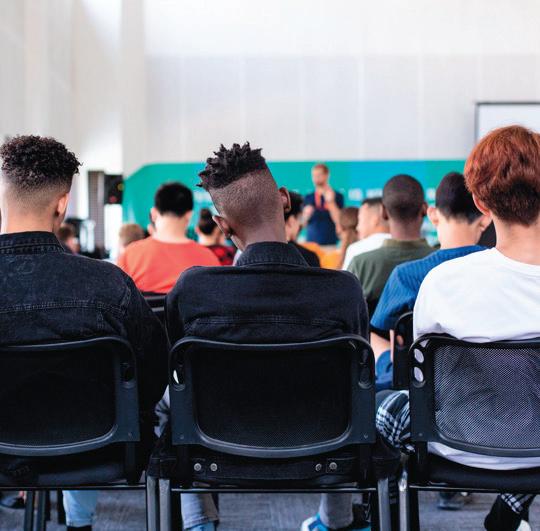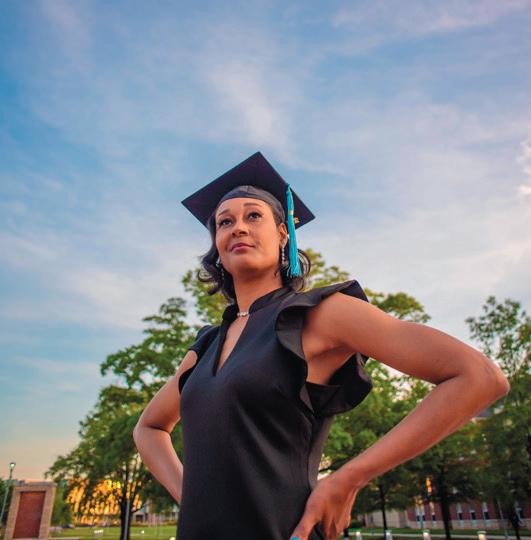




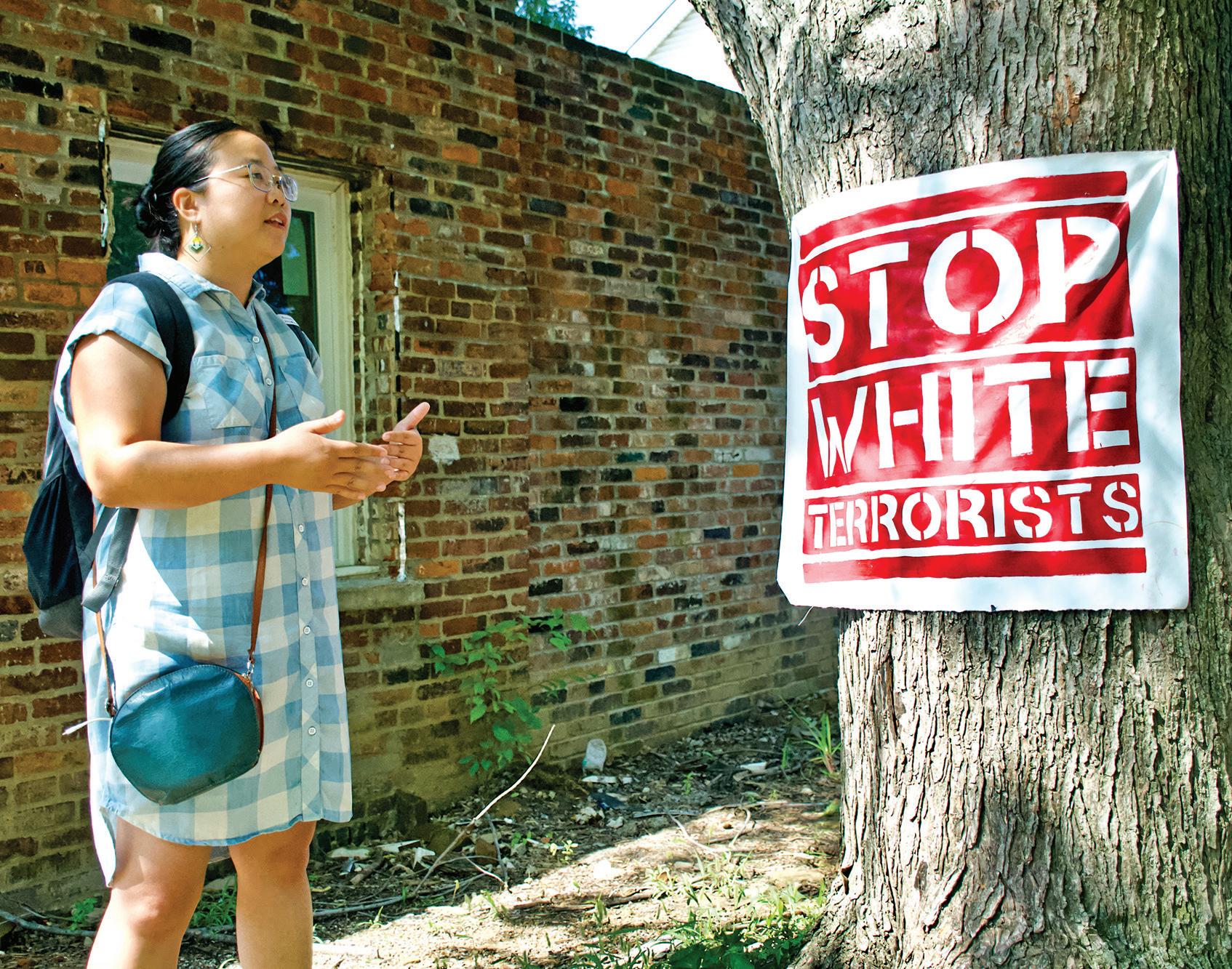
By Dana Rieck
To most white Americans, the noose is but a shameful symbol abandoned along with America’s racist roots. For Black people, the noose is used as a regular reminder that they face death because of their race.
There is certainly no shortage of incidents involving nooses in 2021 alone: eight nooses were found in an Amazon warehouse under construction in northern Connecticut; a Black electrician found a noose hanging in his workspace in Long Island; a Black family near Los Angeles discovered a noose hanging from a tree in their backyard; and a woman in Huntsville, Alabama, has suffered through a string of racist attacks on her home, including finding a stuffed animal monkey with a noose around its
neck on Valentine’s Day. And now, add to the list a Black contractor who on Aug. 5 found a noose hanging from a tree branch in the backyard of the Benton Park house she’d been hired to rehab in the 2800 block of Lemp Avenue in St. Louis.
The property’s owner, Julia Ho, said she bought the residence several years ago and in recent months began construction so that she could eventually move into it. She currently resides in Dutchtown and said she’s previously experienced racist harassment as an Asian American — particularly in the last two years.
Ho’s contractor did not want to be identified for safety reasons, but Ho confirmed she is a longtime resident of Benton Park, where her construction company is registered.
n “I think it’s probably quite commonplace, the ideas that led to a noose being hung in one of our neighbor’s yards.”
— Inez Bordeaux
million project to address health disparities
By Dana Rieck The St.
n Black North County leaders and residents grew louder in their criticism of the two joining their Republican council members in voting to strike down St. Louis County Executive Sam Page’s alreadyin-place mask mandate.
Mayor Jones enacts city’s pandemic aid spending plan
Vetoes $33 million at center of debate A grieving mother’s plea to the unvaccinated
By Sylvester Brown Jr.
The St. Louis American
“Girl, we gonna beat this thing. We gonna beat it!”
Kimberle Jones, 59, couldn’t refuse her daughter’s request to sing a song. She admits she’s no singer but when her daughter, Erica Thompson, 37, who had just tested positive for COVID-19, asked that she sing Michael Jackson’s “Beat It,” she couldn’t say no.
“I just wanted to cheer her up because I honestly thought my daughter was going to beat that virus. I really did.”
Unfortunately, Thompson, the mother of three boys, didn’t beat the deadly virus. In April, the New York Times quoted experts who said, “For each person who dies of COVID-19, there are at least nine newly bereaved” individuals left behind.
On July 4, Jones joined the ranks of the almost six million See MOTHER, A7

By Dana Rieck The St. Louis American
St. Louis Mayor Tishaura Jones on Monday enacted a spending plan for the first $135 million dollars of the $498 million in federal money the city will receive in the next two years through the American Rescue Plan Act. She also vetoed approximately $33 million in line-item allocations from the final package that she argues violate U.S. Treasury laws. Those items were at the center of a month-long standoff between Jones and Aldermanic President Lewis Reed, who added the $33 million North St. Louis economic development plan to the pandemic aid spending bill. It began after a 12-hour meeting in mid-July in which the Board of Aldermen hammered out the details and gave preliminary approval of the bill, the Board of Estimate and Apportionment would have then typically voted to approve the bill. However, Jones and Comptroller Darlene Green refused to second Reed’s motion for See JONES, A7

Method Man launches cannabis line
Method Man, a member of rap group WuTang and actor, has launched a cannabis line titled TICAL. It is named after his first solo album. In partnership with Boulder, Colorado marijuana grower Vera, TICAL has released a limited supply of products to Denver dispensaries. The line includes various strains of popular marijuana plants including Sweet Grease, Free Mac and Orange Cookie Kush and are being sold at Simply Pure and WolfPac Cannabis stores.
“I’m absolutely thrilled at the prospect of bringing TICAL to Colorado’s mature and sophisticated adult-use market,” Method Man said in a statement.
“Our team has worked long and hard to bring the same energy, creativity, and equity to this brand that I have to everything I have done throughout my career.”
TICAL saw the benefit of partnering with minority-owned dispensaries in
Denver for its soft launch. He said his brand will partner with Black dispensaries, womenowned dispensaries and other “disadvantaged” dispensaries in helping them reach their business goals.
“I’m particularly excited about TICAL’s focus and leadership in the cannabis space in working with Black, women, and minority-owned partners from cultivation to dispensaries. We are going to lead by example and ensure that this newly created market is as inclusive as possible,” he said. “We can’t right all the wrongs that disparate criminalization of cannabis has done to our communities, but we most certainly can make a down payment on the way forward with social equity, inclusion, and full economic participation.”

“Do they do [Verzuz battles] with comedians?”
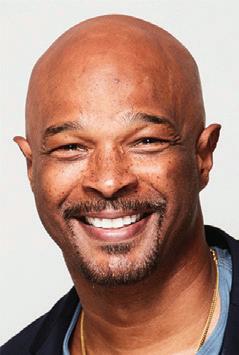
Damon Wayans wants to battle Dave Chappelle in comedy ‘Verzuz’
Damon Wayans appeared on Houston radio station 97.9 The Box on Aug. 13 and was asked if he was familiar with Verzuz, a virtual face-off between entertainers. Its popularity soared during the early months of the COVID-19 pandemic, and a number of stars have gone head-to-head against each other.
Wayans admitted he’s never watched Verzuz, and asked:


His response intrigued the hosts and they asked Wayans who would be a good fit to go against him in a comedy Verzuz battle. He said he would like to challenge Dave Chappelle “Chappelle. I’m calling him out.” Chappelle hasn’t publicly responded to Wayans’ offer.
Naomi Osaka to donate tournament earnings to Haiti earthquake relief
Tennis star Naomi Osaka has promised to donate her earnings from the U.S. Open warm-up tournament to help earthquake relief efforts for her father’s native country of Haiti.
More than 1,900 died in Haiti when a 7.2-magnitude earthquake struck the region Saturday. The death toll is likely to increase.
“Really hurts to see all the devastation that’s going on in Haiti, and I feel like we really can’t catch a break,” Osaka said in a tweet.
“I’m about to play a tournament this week, and I’ll give all the prize money to relief efforts for Haiti. I know our ancestors’ blood is strong, we’ll keep rising.”
According to perfect-tennis.com, the Western and Southern ATP Tournament women’s singles champion receives $255,220 and the runner-up receives $188,945. The event is held in Cincinnati.

























Kevin Hart playfully responds to Don Cheadle revealing his age
Kevin Hart’s new series Hart to Heart, which airs on Peacock, provides people with a space to hold emotional and candid conversations. Things turned left on a recent episode when he and Don Cheadle talked about age.
Cheadle revealed his age to Hart and Hart’s response to was “Damn,” which left Cheadle unamused and set social media ablaze.
Hart did apologize, but it didn’t make much of an impact.
The pair had a quarrel about Hart’s response. He tried to explain, stating that “he didn’t mean for it to come out that way.” Cheadle followed up and said, “We’ll take a poll on how you meant it, when people hear it after the show is over.”
“I can honestly say that that was from a place of love,” Hart continued, but Cheadle still didn’t take what Hart said lightly. Later, Cheadle shared a more positive sentiment to the situation on Twitter and said they should star in a movie together.
“Doing what we do best and that’s being assholes to one another,” Hart said in his Instagram caption, sharing a clip of the interview.
Sources: www.afrotech.com, www.thejasminebrand.com, www.bet.com, www.washingtonpost.com






By Alvin A. Reid
The St. Louis American
Twenty years and more than 10,000 haircuts and stylings later, Craig Blac’s “Community Cuts for Kids” is more than part of the back-to-school scene.
It’s part of the St. Louis region’s fabric.
“I had no idea,” Blac said of his event’s popularity and longevity.
“It started in one location with eight total barbers and stylists combined. The next thing I know we are at 20 years! It’s been a great ride. I wouldn’t change a thing.”
The inspiration for “Community Cuts” came from a group of civic minded DJs and radio executives searching for a new concept in service.
“I was challenged by then Q95.5 Program Director ‘Mic Fox’ and Assistant Program Director ‘MoShay’ to come up with a community event.
With MoShay’s help, we brainstormed ‘Community Cuts for Kids,’” Blac explained. “We started at one community center, I think it was off Page, with volunteer barbers and stylists. Over the years, we have moved to several different locations: Monsanto YMCA on Page, The Herbert Hoover Boys & Girls Club, The Mary Brown Center (East St. Louis), The Urban Bat Cave (East St. Louis) East St. Louis High School & SIUE - East St. Louis.”
Blac estimates “a little over 10,000 haircuts and stylings combined” have been donated.
“And that’s just an estimate. We have also provided services for a lot of kids, and I have to thank all the great barbers and stylists in St. Louis and East St. Louis for making that happen,” he said. Community Cuts ran from Aug. 15 at five locations: Elite Blendz Barber Shop, 5759 Chippewa St.; First
“Allie All Along,” many books available at Urban League Back to School event
and
by
Lynne Reul, and over 6,000 other books will be provided courtesy of The Assistance League of St. Louis literacy program, Books From Friends. During the past year, Books From Friends has distributed more than 15,000 new books to St. Louis Schools
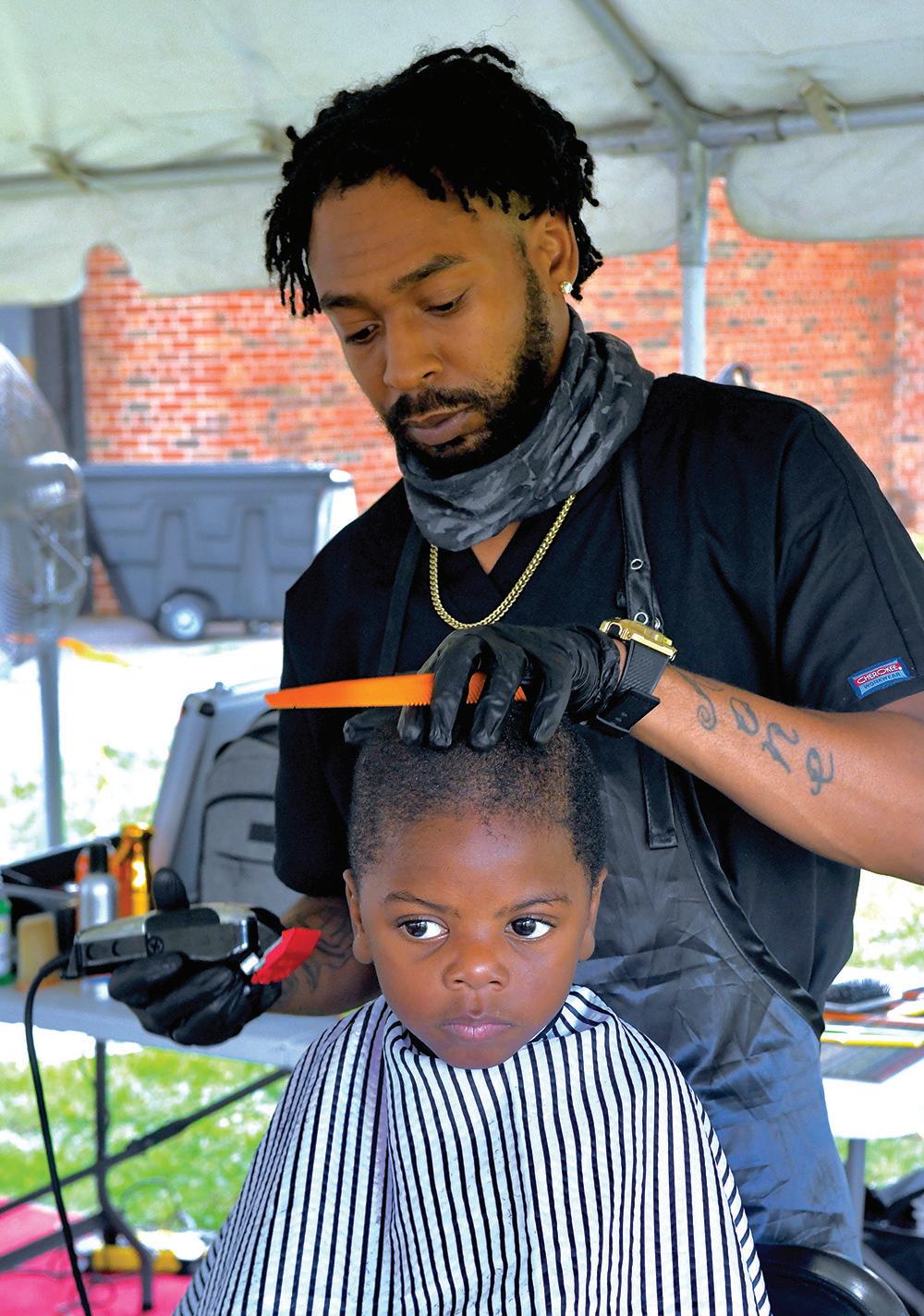
Class Barber Shop, 5332 W. Florissant Ave.; No Limit To Beauty (held at Larimore Elementary School) 1025 Trampe Ave., and East St. Louis High School.
children.
“Allie All Along,” features an engaging set of illustrations and storyline, with themes on family engagement.
“What appears to be a simple story upon first glance actually offers uncomplicated yet practical remedies for helping a child deal with a strong emotion,” reads a Booklist review.
Shelf Awareness says, “Allie All Along”’ deserves a spot on the shelf with “Where the Wild Things Are,” “When Sophie Gets Angry--Really, Really Angry” and “My Mouth Is a Volcano.”
“When a little girl named Allie breaks her blue crayon, she is ‘furious, fuming, frustrated, and so, SO, SOOO ANGRY!’ So angry, in fact, that she turns into a stomping,

Like so many other events, the 2021 edition of Community Cuts “was a little different because of COVID,” according to Blac.
All haircuts and styl-
smashing furry red monster. Her big brother works to help her calm down, giv- ing her a pillow to punch, a toy to squeeze and sug gestions to take deep breaths and count backward.
“As she successfully applies each tactic, gradually reducing her rage, she sheds the brightly colored fur skins that represent her feelings. By the time ‘the rest of the angry [falls] away, there’s just one slightly forlorn little girl in pigtails standing in the room, asking her brother for
ings were by appointment. Individuals had to either log on to Blac’s website, TheCraigShieldsFoundation. org, or call to register. COVID19 protocols including social distancing rules and use of masks were encouraged.
These steps did not impact attendance, as Community Cuts remained as popular as ever.
“I have to thanks my partners, The Made Music Group, The Dwann Dillon Foundation, The Access Foundation, Hot104.1 & 96.3 For The Lou, and Raheem DeVaughn’s Love Life Foundation,” Blac said. He said all the planning is worth it because, “when our kids look good, they feel good, and then they do much better in the classroom.”
A native of Washington, D.C., Blac began his
a hug.”
“The custom book enables the Assistance League to communicate with children and their families and provide questions to think about as the book is read aloud,” said Assistance League President Yolanda PerezCunningham.
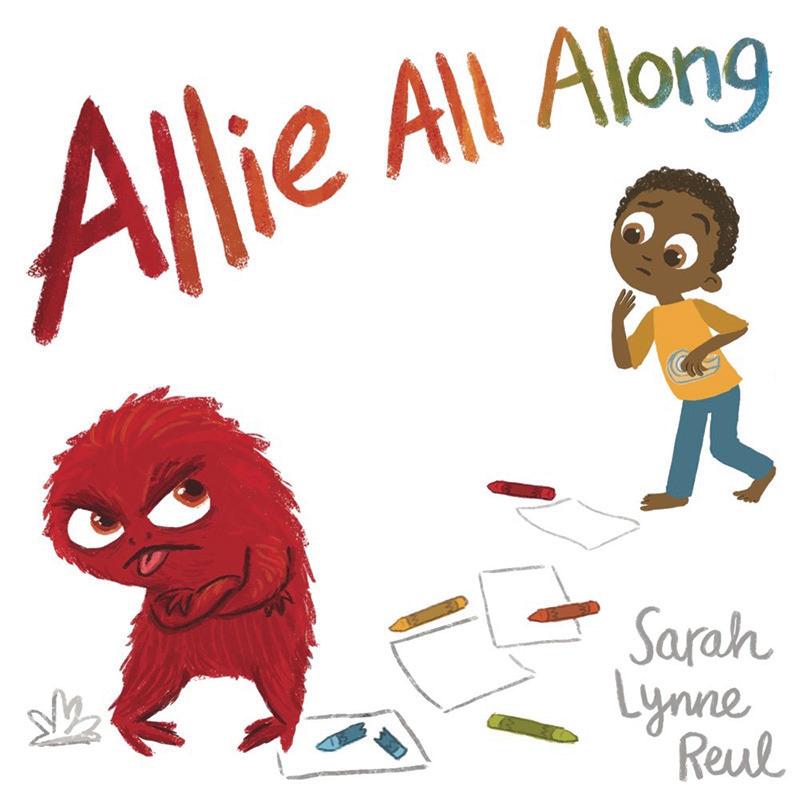
“The goal is to help children understand and process their feelings and to enhance social and emotional growth.”
A special page in the book allows the children to write
broadcasting career there at WPGC 95.5 as an overnight personality and a “street team” member. He was also working toward a B.A. in journalism at Bowie State University in Prince Georges County, Maryland. He worked with popular D.C., jocks, Tigger of BET’s “Rap City,” and Donnie Simpson. He later became assistant promotions and street team director but stayed on the air with a Sunday night go-go show at WKYS-FM 93.9. In June 2000, Blac relocated to St. Louis where he was an on-air personality at the “Blazin’ Hip-Hop and R&B” station WFUN-FM Q95.5. His inaugural, breakout show was titled “The Blac Out.” Local hip-hop artists craved an opportunity to appear on the popular show, and he offered them the opportunity to perform live during his “St. Louis Love” segment. St. Louis’ own Nelly and the St. Lunatics made several of their first radio appearances on Blac’s show. He remains a part of the St. Louis and Washington D.C., communities. Community Cuts will be held



their names, as owners and readers.
Perez-Cunningham said Barnes & Noble “has been an invaluable partner of Assistance League of St. Louis and shares a commitment to our community and to literacy. The Assistance League of St. Louis is an all-volunteer group of nearly 500 volunteers. Its mission is to identify, develop, fund and implement ongoing philanthropic programs to serve specific needs of children and adults in the St. Louis community. Its programs include providing new school uniforms to shoes and socks and personal care items for crisis shelters and books for aspiring readers. All funds raised are returned to the St. Louis community.
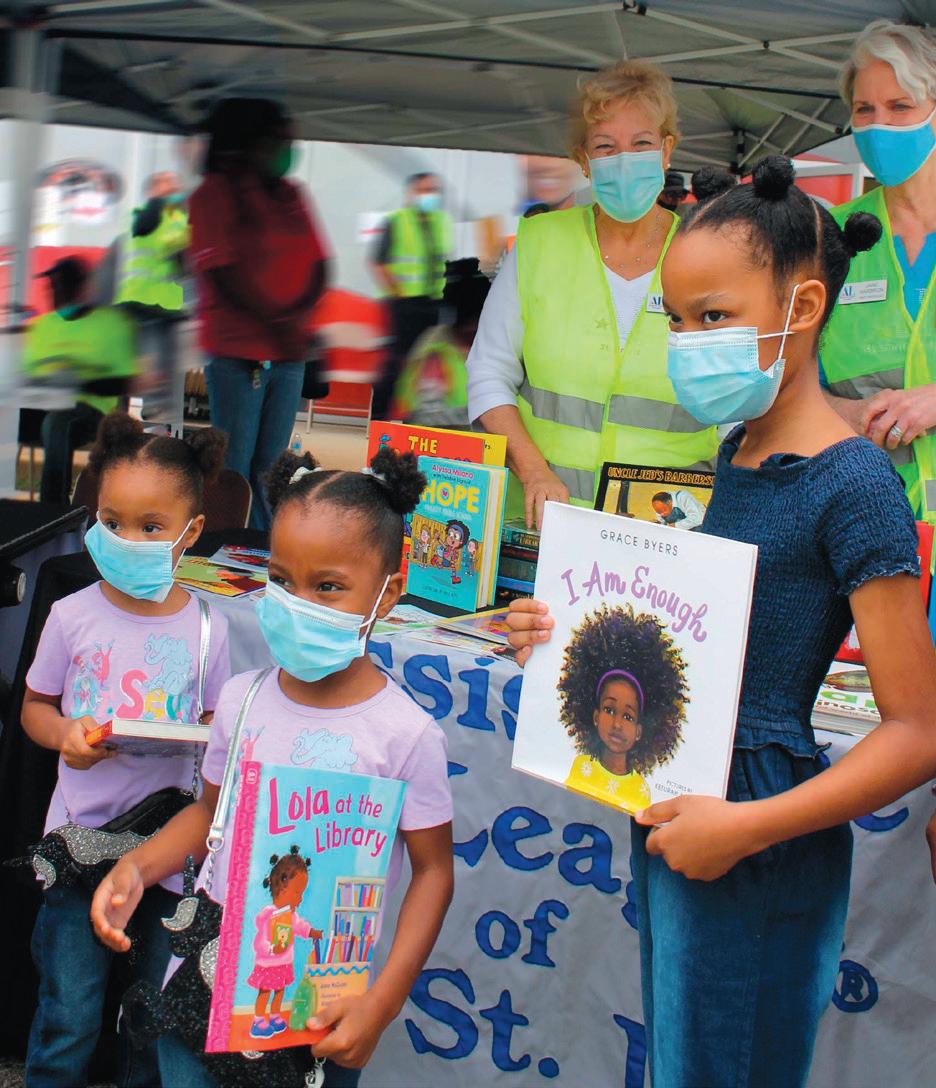
“The topic of racial and ethnic disparities and inequities in medicine and health care are of critical importance.”
-Dr. Paul Fontanarosa
Interim Editor-in-Chief,
The Journal of the American Medical Association
The persistent pattern of racial and ethnic health disparities across this country is dire and has not changed over the last decade, according to recent studies. That makes the political shenanigans around the serious issue of addressing the resurgence of the delta variant of the coronavirus even more unacceptable, even reprehensible, and particularly around the role being played by the two Black representatives on the St. Louis County Council. On Tuesday night, we saw Council Chairwoman Rita Heard Days and Councilwoman Shalonda Webb again dutifully cast their votes against a mask mandate for St. Louis County, in line with the Republican minority on the council. (The City of St. Louis has a mask mandate in place.) By refusing to support a mask mandate, this newspaper feels that these two Black councilwomen have abdicated their responsibility to support what public health authorities have made clear is a valuable tool in mitigating the spread of this highly contagious, sometimes lethal virus, that has struck predominantly Black North County disproportionately hard. The highlytransmittable delta variant and low vaccination rates have contributed to the growing rise in cases in North County. This surge has led public health experts to support mask wearing even among those already vaccinated. Health care professionals have unequivocally concluded that masks are an important tool in slowing the spread of the deadly virus.
So why do we see two Democratic council members stubbornly cling to this Republican anti-mask policy stance that is not in the interests of the health and wellbeing of the people who elected them?
We hear their limp arguments like: “it’s unenforceable,” “I’m independent,” “It’s a matter of personal choice” and we know best how to confront this health disaster. If you don’t believe us, then read our “plan” that we created ourselves, based on our familiarity with this public health issue and our expertise in solving these challenging problems and their root causes.
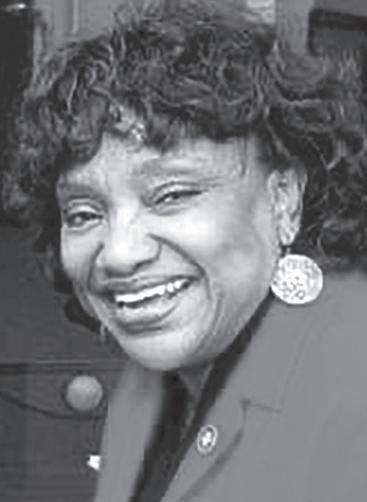

Yet Days and Webb have joined their Republican colleagues on the council who prefer anti-mask mandate policies like other high-profile Republicans who similarly proclaim their opposition. That includes Trump Republican acolytes Governor Greg Abbott of Texas (he was recently diagnosed with COVID himself), Nebraska Governor Pete Ricketts, Iowa Governor Kim Reynolds, Governor Doug Ducey of Arizona and Governor Ron DeSantis of Florida as well as our own Governor Mike Parson of Missouri.
According to the Washington Post, new polls show that nearly two out of three Americans say they support their state or local government requiring masks in all public places to slow the spread of the coronavirus.
By the way, they seem to imply that they are certain that their new best Republican political friends on the council will eagerly follow their lead on this plan that offers special assistance to North County just as they have been willing supplicants to their Republican agenda.
Days and Webb are either naive or being devious in their conduct around an issue that needs to be approached forthrightly with the best scientificallyinformed response to the needs of their constituents rather than building a political coalition with Republicans who have long shown disdain or outright opposition to the problems that continue to bedevil Black communities in North County and around the entire region, state and nation.
If there is $50 million in federal relief funding to be spent, it certainly should have input from public health experts and not depend on political operatives who are primarily interested in repairing the undisputed political damage to these two elected officials that was unexpectedly created by their selfish political recklessness.
We ask Days and Webb to help us understand why they have chosen this risky political course, particularly during these times of a surging pandemic, heightened voter suppression, housing insecurity, low wages and gun violence. A hastily scripted “plan” does not suffice. We need to know that you really care about your constituents more than your now embarrassing political gamesmanship.
By Mike Jones
“Many American police officers represent a greater threat to Black people than the Taliban.” Speaking on international matters seems foreign to Black leaders When I write a column, I try to focus on an idea or event that is relevant to Black America.
I have no scarcity of recent events to choose from; the release of the preliminary 2020 census data and the Senate passing a bipartisan trillion-dollar plus infrastructure bill. Both have profound implications for Black America.
But I’m choosing to address a different subject, Afghanistan.
I know someone just asked, ‘what does Afghanistan have to do with Black folks?’ What the United States is doing in the world, has a direct impact on what is or isn’t happening here. You should think about domestic and foreign policy issues as a Venn diagram. This is an illustration that uses circles to show the relationships among things, or finite groups of things. Circles that overlap have a commonality, while circles that do not overlap do not share those traits. Venn diagrams help visually explain similarities and differences between two concepts.
The fall of Kabul and earthquake in Haiti highlight a glaring weakness of national Black political leadership. There is a total absence of Black perspective in addressing global and international issues. Why do Black political leaders rarely, if ever, speak publicly about major foreign affairs issues? How can they never seem to have anything to say about American foreign policy impact on Black America?

And in the spirit of transparency, you won’t read much about foreign affairs in Black publications or hear it discussed on Black radio or podcast formats. I’m guilty of the same charge. But it’s never a wrong time to do the right thing. This column is about foreign policy and the Black community. It’s important for Black political leadership speak to foreign policy issues from the perspective of the condition of Black America. Tell me where you spend your time and your money, and I’ll tell you what’s important to you. Put another way, tell me where you don’t spend your time and money, and I know what’s not important to you. With that in mind, let’s talk about Afghanistan.
From 2001, when the U.S. invaded Afghanistan, until the close of the American Embassy in Kabul last weekend, 20 years passed. In those 20 years, the United States spent $2 trillion in Afghanistan. Remember, this nation has spent billions in Iraq over the same 20 years. In that same 20 years, the U.S. Government has refused to fund adequately, health care, education (K-12 and higher education), affordable housing (the last president with a housing policy was Richard Nixon) or mass transit. It wouldn’t be hyperbolic to say America has breached the Social Contract and shredded its social safety net. Advocates and defenders of
By Ben Jealous
Rep. John Lewis, the civil rights icon who died last year, liked to tell activists that building a better world depended on people being willing to make “good trouble.” Rep. Cori Bush, D-MO., has just given us an example of effective troublemaking that should inspire us to action.
Rep. Bush is in her first term as a member of Congress representing St. Louis. She didn’t come with a typical resume of prestigious college and law school degrees and previous political jobs. Bush got into politics protesting police killings of unarmed Black men. Because her work was seen and respected in her community, she beat the odds and beat long-time member of Congress William Lacy Clay.
Bush has experienced eviction herself. She knows how disruptive and dangerous it can be. So, she wasn’t going to stay quiet when Biden administration officials and congressional leaders were ready to let a COVID-19 moratorium on evictions expire and put millions of families at risk.
The temporary eviction ban was put in place by the Centers for Disease Control last September as a public health measure. Millions of families fell behind on rent because of the economic turmoil caused by the pandemic. The CDC knew that forcing those families out of their homes and into shelters or onto the streets in the middle of a pandemic would cost lives.
That original moratorium expired on July 31. It made no sense to kick people out of their homes just when the Delta
variant of the COVID-19 virus was pushing the pandemic into another deadly phase.
But the Supreme Court’s right-wing justices had signaled their disapproval for the moratorium. So, the White House and congressional leaders played a bit of lastminute hot potato before Congress left town for its August recess without taking action to protect the families at risk of homelessness.

Rep. Bush grabbed a sleeping bag and camped out on the steps of the U.S. Capitol for several days to shame people into action. You can be sure that many of her colleagues didn’t like being put on the spot as they went on vacation. Some of them anonymously criticized her tactics. Her hometown paper said she was ignoring “political reality.” Her rightwing critics ranged from dismissive to abusive. But it worked. Bush’s troublemaking meant that public officials could not just deflect attention from the crisis that was about to engulf thousands of families. And the White House worked with the CDC to extend protection against eviction for many people at risk. The new moratorium is being challenged in court, and it will expire in October. But it is buying time for families at risk. It is giving local officials a chance to get money into the
America’s foreign adventures will argue it’s necessary for national security and/or spreading and defending America’s democratic values. What does that mean if you’re a Black American?
Many American police officers represent a greater threat to Black people than the Taliban. There are more unarmed Black people killed in America by the police in a year, than have been killed by the Taliban in the last 20 years. So much for our national security.
The country that’s so concerned about democracy in Afghanistan has Republican state legislatures suppressing voting rights all over the country. Congress won’t, or can’t, pass the John Lewis and the For the People Voting Rights Acts. So much for America’s commitment to democratic values. There are over 50 African American members of Congress, and they represent at least 25% of the House Democratic Caucus. They are part of the Democratic leadership and the Democratic majority in the House cannot function without their cooperation and support. They’re aware of everything you just read. What would happen if they began to call out America’s hypocrisy from the well of the House of Representatives? It would make managing America’s foreign policy agenda more difficult, more problematic. What if they said to America, ‘the cost of your empire is the maintenance of the health and welfare of the citizens of your republic?’
It’s called leverage, and it’s what serious politicians, as opposed to ambitious elected officials, use to make people say ‘yes,’ when ‘no’ is in their heart.
I’m a constituent of Shalonda Webb in the 4th district and wrote a scathing letter to her last night and haven’t gotten a response as of yet from her office about herself and Rita Days putting the lives of the Black constituents in their districts in jeopardy by going along with the three Republicans, including a disgraced police chief, by voting against a mask mandate which basically gave Eric Schmidt the win.
I’m writing this email to let you that I personally WILL NOT vote for you when your council seat is up for re-election in 2024. Your decision along with Rita Days as the only two Blacks on the council to go along with Tim Fitch and the two other Republicans on the council, who from the beginning don’t give a damn about protecting people from this virus voted down a mask mandate, (is disgusting). Your political ploy will do great harm to the Black constituents of yourself and Rita Days because of your beef with the other democratic members and the county executive on the council and I’m not letting them
hands of people who need it. Bush’s good troublemaking also brought needed attention to the fact that Congress had approved $46.5 billion to help renters and their landlords, but some states and counties hadn’t distributed a penny of it even months after they got the money.
When I saw people criticizing Rep. Bush for her tactics, I thought of Martin Luther King, Jr.’s Letter from a Birmingham jail. He wrote that he had almost concluded that a greater stumbling block to the freedom movement than the KKK was the white moderate more devoted to “order” than justice, who constantly says, “I agree with you in the goal you seek, but I cannot agree with your methods of direct action.” Rep. Bush saw that families behind on rent were facing a crisis point. Our democracy is also facing a crisis point. In state after state, where Republicans are in control, they are imposing new barriers to voting as they try to prolong and expand their hold on power. They want the power to resist progress on racial equity, access to health care, and all the other issues that motivated people to turn out and vote for Joe Biden. We can’t let them win. Voting rights activists across the country are organizing. They’re looking for people to help them make good trouble. When that opportunity comes your way, think of John Lewis and Cori Bush. And answer the call. Ben Jealous serves as president of People For The American Way
and style.
off the hook at all. But for you and Rita Days as Black women on the council and letting the minority in Fitch and the other two Republicans basically having the majority vote on the health of your constituents which is mostly Black in North St. Louis County is INEXCUSABLE period.
Also what you and Rita Days have done is basically telling the Black constituents in your areas who have been disproportionately ravaged by COVID-19 to go to hell while you have SOLD OUT THE HEALTH AND WELL being of your constituents because of disagreements with the county executive who by the way is a medical doctor and other democratic members of the county and just played Russian roulette with your constituents health.
SHAME ON YOU and RITA DAYS I wouldn’t have came in that council chamber if I had to with all those maskless fools in there and both of y’all deserved to be talked about not in a good way amongst the local Black media. Thank you and you just lost my vote.
Donnell Watt





Families browsed through scores of backpacks filled with school supplies during the third annual Ride N’ School Supplies Charity Car and Bike Show on Aug. 7 at the O’Fallon Park YMCA. The event also featured some of the area’s sportiest automobiles.
The city of St. Louis, the city’s municipal court and the St. Louis Circuit Attorney’s office have announced that they are co-sponsoring “Warrant Forgiveness Days” later this month, and city officials are adding an additional incentive.
COVID-19 vaccines will be offered on site and proof of full vaccination could mean $100 off court costs or existing fines for Municipal Court cases.
“The city is ready to work alongside judicial and enforcement partners to help thousands of St. Louisans set aside outstanding warrants for non-violent offenses and encourage them to get them vaccinated against COVID-19,” St. Louis Mayor Tishaura Jones said in a news release.
“These events will help participants get right with the law and get right with their health. We have to work together to protect public health and public safety, and I’m grateful to the courts for their leadership on this issue,” she said.
City officials estimate there are roughly 140,000 warrants eligible for participation in the program, with the vast majority (138,000) able to take advantage of the Municipal Court full vaccination incentive.
“In the midst of the continuing COVID-19 pandemic, City Court is pleased to support our pub-
lic safety mission and Mayor Jones’ initiatives to promote vaccination by offering our Warrant Forgiveness Days program for the fourth consecutive year, along with the opportunity for residents to receive a COVID-19 vaccine at the same time,” said Administrative City Court Judge Newton McCoy.
“City Court is also pleased to encourage vaccination by a reduction of outstanding fine balances of up to $100 upon proof of full vaccination.”
Participants should bring a valid photo ID, phone, and provide a valid email address, if they have one. Participating individuals will not be subject to arrest at these events.
Other services and activities will be offered during Warrant Forgiveness Days including food trucks, city departments offering on-site rental assistance, and more.
The events are scheduled for 8 a.m. to 5 p.m. Friday, Aug. 27 at the Circuit Court Building (10 North Tucker Blvd) and 8 a.m. to 5 p.m. Friday, Aug. 27 and Saturday, Aug. 28 at the Municipal Court Building (1520 Market Street).
Individuals who have warrants before the Circuit Court should call and verify if they are eligible. Warrant forgiveness for Circuit Court warrants will only be available on Aug. 27. For inquiries, call (314) 641-8214.
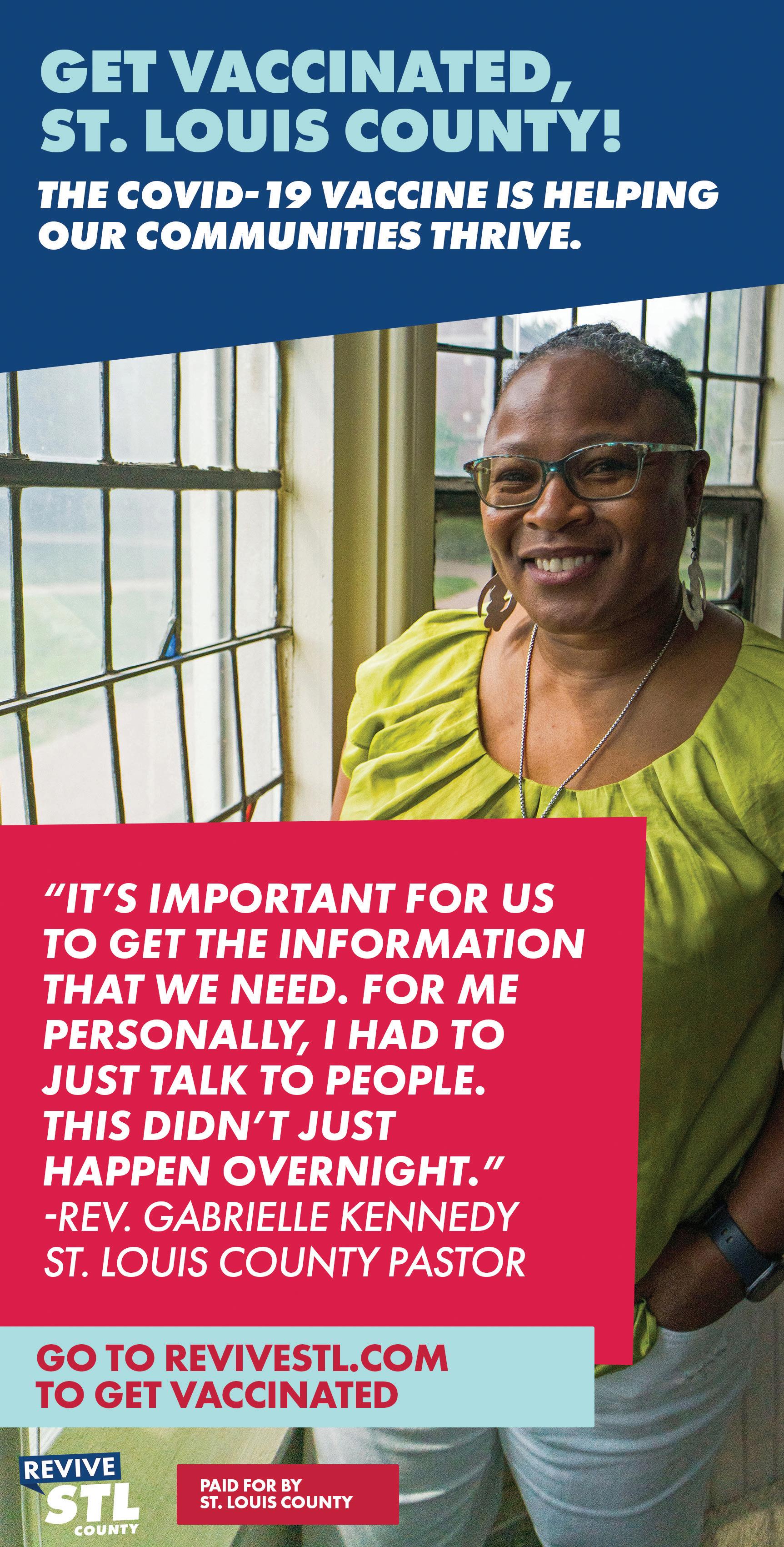
By Oseye Boyd
I used to think of February as the Blackest month of the year. It’s the month set aside to honor and celebrate Black history in all facets. Sure, June, aka Black Music Month, celebrates our contributions to what is known as a universal language, but it’s not as all-encompassing as February.
However, August is giving February a run for its money. This month is Black Business Month, Black Philanthropy Month and Black August. August is Black, y’all.
I acknowledge, celebrate and honor my culture, 24/7, 365, but it’s always good to take time to pause and make deliberate decisions for collective uplift. And collective uplift is what it’s all about. Try to support your business on a rugged individualism or pull-yourself-up-by-your-bootstraps mentality and see how long your business lasts. You must have customers to make your business a success. Wouldn’t it be great if each of us were our own little island and didn’t need other people to survive?
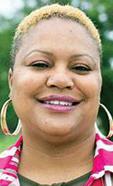
I remember my “Each one teach one” blue T-shirt with the white letters making a circle. I understood the significance of the words, but today I understand on a deeper level. Some of us like to fool ourselves and think we made it all alone. I guarantee there are parents, teachers, mentors, coaches, friends, family — someone — supporting each of us in our endeavors toward greatness. Heck, even your doubters give you fuel to push yourself. It’s a nifty slogan, “Each one teach one.” It is about collective uplift and that’s what August is about for Black people.
Black Business Month reminds us to spend our dollars with Black businesses. We know our businesses often have less capital. They were hit hard by the COVID-19 pandemic. Many didn’t receive a Payroll Protection Program loan or received a smaller amount than other businesses. The call to support our businesses became more acute in 2020, and we haven’t let up. I continue to see people purposely searching for Black-owned businesses. From doctors to party planners.
Black Philanthropy Month celebrates our culture of giving, dating back to Africa. What I love about Black Philanthropy Month is that it makes us aware of how generous we are. It’s the affirmation we need to defend against the negative messages that come with being Black. This year’s theme is, “TENacity: Making Equity Real.” Black Philanthropy Month is celebrating its 10th year.
Philanthropy is often viewed through the narrow scope of monetary donations. However, philanthropy is giving of your time and talent, not just your treasure. Donating money is vital, but that’s not the only way to give. Sometimes the giving of time and talent is the only way to give. I’m reminded of the aunts and grandmothers who take on children who need a home or cook enough to feed the neighborhood.
Black August pays tribute to our resistance, our collective strength, revolutionaries, freedom fighters, political prisoners and our continued fight for our humanity. Black August began in San Quentin State Prison in California in 1979 to honor fallen members of the Black liberation movement. It’s interesting to note many important events for Black people happened in the month of August: enslaved Africans brought to Jamestown, 1619; the start of the Haitian Revolution, 1791; Nat Turner’s rebellion, 1831; and Watts rebellion, 1965, to name a few.
Black August reminds me that while the fight isn’t over, so much of the heavy lifting was done by those who came before me. So many of our ancestors bore the brunt of the abuse of white supremacy so we could live a better life. I won’t squander it, and that’s why patronizing Black-owned businesses, and donating our time, talent or treasure (or all three) to each other is the very least we can do this month.
February is a time of reflection, but let’s make August a time of action. Let’s make it a great month to be Black.
Oseye Boyd is editor of the Indianapolis Recorder and an author.

By Sophie Hurwitz
The St. Louis American
“We are not tools of rhetoric to make a political point,” said Jewish Community Relations Council Executive Director Rori Picker-Neiss at a press conference organized by County Executive Sam Page Monday.
Picker-Neiss was one of three Jewish community leaders at the conference, convened in response to a series of comments equating mask mandates to the Holocaust by members of the public at last week’s County Council meeting.
The group of Jewish leaders called on County Council chairwoman Rita Days to
Continued from A1
two health centers, two mobile vaccination clinics and a canvassing campaign led by the two women and other Black leaders.
The new proposed legislation is called the “North County Health and Wellness Recovery Program.” Days did not return multiple phone calls from The St. Louis American this week and Webb was unavailable for comment Wednesday. The American also did not receive notification of the media event.
“Masks mandates helped slow and contain the disease until effective vaccines were approved and reduced [cases],”
“use her gavel” to shut down hate speech in county council meetings. Last week’s incidents weren’t the first time in the recent past that members of a minority group have been attacked or used as political pawns at a County Council meeting. Dr. Faisal Khan county Director of Public Health, was verbally attacked and called slurs by anti-vaccination protesters two weeks prior, as Days and the County Council remained silent.
Stacey Newman, executive director of ProgressWomen, also spoke at the press conference, requesting an apology letter from Days.
“We insist that the St. Louis council, along with chair Rita
Days said during the conference, noting that shutting down the community helped stop the virus’ spread but at an economic cost.
“While most council members appreciate the science behind wearing a mask, many feel overall the county leadership has failed to lead on this issue.,” she said. “The so-called mask mandate was done in the absence of any coordinated dialogue with the council so most of us felt we were caught off guard.”
Page on Wednesday said the county has always focused its pandemic resources on where they are needed he most and decisions are made through a lens of equity.
“There’s too much virus circulating in our community and there’s too great a risk not to

Days, apologize to the Jewish community, and demand that you all refuse to allow any further hate speech in public commentary,” Newman said. She stated that comparisons of mask mandates to Naziism were made “at least three times” during the public commentary portion of last week’s meeting.
“I was appalled because none of the hate speech was gaveled down during Tuesday night’s meeting,” Newman added. “Nothing was done to cut off the antisemitism or even say it was out of order.”
During the meeting on the Aug. 10, one citizen alluded to the Holocaust and said that COVID-19 was not real: “What
get vaccinated and please wear a mask,” he said.
The rolling seven-day average of cases in the county was 283 a day on Wednesday, which is considered high compared to areas around the country.
Last week, a group of at least 14 North St. Louis County Democrats posted online a flyer in support of a mask mandate in the county.
“The health of our community is so very important, WE stand with the health [and] medical experts,” a flyer from the group stated. “They recommend the community wear a mask to help slow the spread of this deadly COVID-19 virus. It is our duty to protect the community at ALL Cost[s]. We are asking that the community PLEASE WEAR A MASK while in public spaces. GET VACCINATED! TOGETHER WE WILL GET THROUGH THIS.”
At least one of those leaders who appeared on the flyer have told local media that they were included without their consent, including Bellefontaine Neighbors Mayor
Continued from A1
“She was there with her crew — they were just totally speechless and shocked,” Ho said. “Originally, they were supposed to work on the foundation over the weekend, but they didn’t. I didn’t want them going back there until they felt safe.”
Ho said she was out of town at the time the noose was found but based on when the contractor was last at the property, she believes the noose was hung between July 29 and Aug. 5. It was found on a branch about 20 feet from the ground in the backyard near the alley.
It was wrapped around the branch two or three times, and whoever hung it most likely required a ladder to do so.
The property belonged to a white man, Ho said, before she purchased it several years back. She believes this was a specific attack on her and her contractor.
The neighborhood’s alderman, Dan Guenther, said the incident is under investigation by St. Louis police and the FBI hate crimes field office in the city. Guenther has represented the ninth ward for just over four years, and was reelected for another term in April.
“[My] initial reaction was shock, anger, [fury] — add as
did the Nazis say? They said the bigger the lie the more we’ll believe it,” he said.
Another asserted that Khan’s experience of racism at the County Council meeting never happened, and that County Executive Sam Page’s investigation into that incident would turn up fruitless. And two speakers falsely asserted that the vaccines were violations of the Nuremberg Code, a research ethics doctrine instituted in 1947 to regulate medical experimentation in response to Nazi experiments on their Jewish prisoners. As the vaccines are not experimental drugs, they are not in violation of the Nuremberg Code.
Several times, Days allowed
Tommie Pierson Sr. But Yolonda FountainHenderson, Norwood Township committeewoman, appeared on the flyer and told The St. Louis American she took a stand because she’s not “one of Page’s pawns,” as some have suggested. She added that she believes everyone should be wearing masks in public.
“You’re saying you do not support the mandate but you’re sitting on the council and you all have masks on,” she said, adding later that the mainly white crowds showing up to the meetings do not represent her or Jennings residents.
She addressed a comment made by Days that her critics were standing behind a building and throwing rocks without helping to improve the situation.
“No one is hiding around and throwing a rock,” Fountain-Henderson said.
She said she’s not working to hurt Webb or Days, but rather keep her community safe.
“It’s about the people — it’s not about Rita, Shalonda, it’s not about Sam — it’s about the people of St. Louis County.
many synonyms that you want — outrage,” he said. “And I would say that it’s a shock because I’ve lived in the neighborhood almost 20 years and I sought out the neighborhood — and I know a lot of neighbors seek out the area — because of the diversity and because of the fact that we all pride ourselves in being a very open and inclusive neighborhood.”
The FBI defines a hate crime as a “criminal offense against a person or property motivated in whole or in part by an offender’s bias against a race, religion, disability, sexual orientation, ethnicity, gender, or gender identity.” The agency is careful to note that hate itself is not a crime.
Guenther, who is white, said that in his four years in office he’s witnessed dog whistles in the community and other more passive acts of racism, but nothing so overt as hanging a hate symbol in someone’s yard.
“That is something that I have never seen,” he said.
Ho said she has her suspicions of who is behind the noose, as her family has owned a building on Jefferson Avenue for years in which they and their Black business tenants have suffered racist harassment. She’s handed those names over to the police.
Inez Bordeaux is the manager of community collaborations for ArchCity Defenders and the ninth ward’s committee
speakers to continue past their allotted three-minute time, before being reminded to cut them off and allow the next speaker to come forward.
At Tuesday’s meeting, a week since these incidents, Days stated that she does not condone the use of offensive language. “It was said that I allowed antisemitic rhetoric without gaveling down or commenting on the actions of certain citizens,” Days stated. “This is a public forum. However, under no circumstances do I tolerate or condone that type of behavior. I might not agree with what you say, but it is your right to say it.”
However, she also noted that she did not believe that any
Where do we go from here?” she said.
The St. Louis County Council has experienced weeks of turmoil since St. Louis Mayor Tishaura Jones and Page enacted a mask mandate July 26 as the delta variant spread throughout the country and made its way into Missouri.
However, Page received significant pushback in the county. The day after the mandate went into effect, the St. Louis County Council voted 5-2 to end the mandate after a lengthy and raucous public comment session that received national news media attention after acting Health Director Dr. Faisal Khan wrote a public letter to Days outlining the racist harassment and threats he said he faced during the meeting and as he was leaving.
As the chairwoman, Days faced criticism for her handling of the crowd and admonishments of Khan who asked her multiple times to restore order. Days later told The St. Louis American she believed the meeting went well and she maintained control of the raucous, mainly white crowd. She
woman. She said she was horrified for Ho and her contractor, but not surprised.
“I think it’s probably quite commonplace, the ideas that led to a noose being hung in one of our neighbor’s yards,” she said. “I think a lot of times we let the Black Lives Matter signs that are in people’s front yards and hanging in their windows kind of lull us into a sense of complacency.”
She said she doesn’t know if the police will solve the case but she also doesn’t believe their reactionary function keeps communities safe in the first place.
“But I do believe that we keep our neighborhoods safe by getting to know our neighbors and having relationships with the people in our community,” she said, later adding: “We have to make racists afraid again.”
Ho has taken the situation into her own hands, mobilizing the community to show its support and solidarity. Neighbors came together at Arthouse St. Louis and painted anti-racism signs, one of those signs now hanging on the tree where the noose was found. Ho said a group of residents plans to canvass Saturday in order to distribute signs and talk with people about the incident.
“I am not surprised that this happened because I feel like there is definitely a racist culture in Benton Park overall and
biased language had been used in the meeting in the first place, and stated that she had received messages from three Jewish people in the audience stating “saying they heard nothing offensive” and that they did not believe any commentary to be out of order. No mask mandate has been instituted in St. Louis County, after four consecutive meetings drew large crowds opposed to mask mandates. The City of St. Louis is under an ongoing mask mandate. There are currently more than 500 COVID patients experiencing serious illness in area hospitals, 84% of whom are unvaccinated.
said she did not hear any disparaging remarks made toward Khan while he stood before the council.
Since then, the St. Louis County Council meetings have been unruly and raucous. There have been hours of public comment from people who feel their rights are being violated with mask mandates and possible vaccination requirements. They repeatedly call for Page to resign.
The mask mandate remains in effect in the city as the county’s mandate works itself through court. Jones on Wednesday announced that civil service employees — nearly 6,000 workers — will be required to be fully vaccinated against COVID-19 by Oct.15 or get tested for the virus on a weekly basis.
“St. Louis is joining the ranks of major public and private sector employers across the country who are requiring vaccination to protect public health,” Jones wrote. “By encouraging vaccinations, we help keep our hospitals running, protect our children, and save lives.”
that there are other times that are much less blatant … [but] still very much racially charged where I felt hostility from neighbors in the area,” Ho said. “So, although I was definitely disgusted and I was shocked that this happened, I wasn’t really too surprised, I feel like something like this could happen anywhere.”
The United States Department of Justice tracks hate crimes across the country. Surprisingly, racially motivated hate crimes saw a notable decrease in Missouri from 2017 (79) through 2019 (52). Data for 2020 was not available. However, from 2018 to 2019, hate crimes based on sexual orientation in the state doubled (from eight to 16) and those based on religion increased more than four times (from three to 13) in the same time frame.
St. Louis police declined to comment on the case but confirmed officers did respond to the Lemp Avenue property after the contractor found the noose hanging from a tree. Ho said they took the noose as evidence. They also asked that anyone with information contact Crimestoppers at 866-3718477, where callers can remain anonymous if they wish. The FBI St. Louis field office did not immediately return a request for comment on the investigation.

a vote because it still included the $33 million in development funds.
They said that they would not vote on a bill that city counselor Matt Moak, who, in conjunction with auditor Rubin Brown, asserted Reed’s $33 million development plan fell outside of federal regulations for spending American Rescue Plan Act funds.
What followed were weeks of a contentious standoff between Reed and Jones, in which Jones said she would not vote until those provisions were amended and Reed refused to amend the bill while remaining adamant they followed federal regulations.
Continued from A1 families in the U.S., who are grieving the loss of a loved one due to the pandemic.
Jones shared her daughter’s tragic story with The St. Louis American in hope that it may inspire people to get vaccinated. Jones, who was vaccinated in March, urged her daughter to do the same. She recalled her daughter’s resistance.
“My daughter said science hadn’t even found better treatments for illnesses like diabetes or cancer. Yet, they came out with a vaccine for COVID so fast. She honestly believed the virus was man-made to eliminate the Black race.”
Jones defined her daughter as “unique, crafty, beautiful and full of life.” Both enjoyed interior decorating.
“She was my shopping buddy,” Jones said. “We shopped together all the time and Erica would take me to pick up items I’d bought from Craigslist. She loved buying things for her house.”
Both women lived in the St. Ann area. Thompson had struggled with asthma for decades and had several scary bouts earlier this year, her mother said. It was not unusual for her daughter to wind up in an emergency room with breathing problems.
When Thompson called her mother after Mother’s Day, saying she had chest pains, Jones didn’t panic. She did, however, when Thompson called back from St. Mary’s to say she tested positive for COVID-19 and was being admitted.
Hospital administrators called Jones, asking that she come to the hospital. They needed her to convince her daughter to go on a ventilator.
Doctors told Jones her daughter would die if she wasn’t incubated.
“She cried and cried and said, ‘I want to live,’” Jones recalled. “She didn’t want to be incubated. She didn’t believe she’d come out of it.” Thompson eventually decid-
Jones and Green eventually agreed to approve it Aug. 6 and the Board of Alderman passed the bill with 21 aye votes Aug. 11.
The approval of both the Board of Aldermen and Board of Estimate and Apportionment were required for the measure to become law and for the funds to be used by the city.
“This is a public safety plan, a public health plan, and an economic relief plan all in one,” Jones wrote in a statement Monday. “We have to boost our vaccination rates, help keep families in their homes and address the root causes of crime.”
Jones’ office said the final package was crafted after they collected 2,500 public comments and held multiple community feedback sessions.
The relief package includes
ed she’d go on the ventilator. It was just before she was sedated that the daughter asked her mom to sing Michael Jackson’s song to her.
It was the last time Jones felt she truly communicated with her daughter. Thompson never came off the ventilator. With failing lungs, she was transferred to St. Louis University hospital. Doctors put her on an extracorporeal membrane oxygenation (ECMO) machine because her lungs were not healing.
“She developed a lot of infections, blood clots, her kidneys started shutting down, her
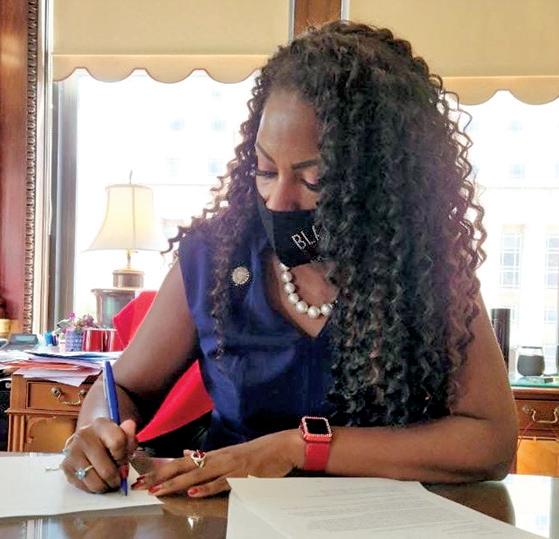
$500 direct cash assistance payments to 10,000 St. Louis families negatively impacted by the COVID-19 crisis; $8 million in public health infrastructure to connect people with the resources and get people vaccinated; $49 million in direct economic relief for those who
skin got real dark. It was not a pretty sight. It was just heartbreaking to watch her body not respond to any medication. It was like my daughter wasn’t even her,” Jones said.
Thompson was hospitalized for 50 days. Doctors called Jones and told her her daughter was “slipping away.” They asked that she gather the family. Jones did and one-by-one each family member went to Thompson’s hospital room to kiss her and say goodbye.
While most Americans were celebrating Independence Day, Thompson passed away that afternoon.
St. Louis Mayor Tishaura Jones signs the American Rescue Plan direct relief package into law on Monday, Aug. 16. The bill lays out plans to spend $135 million in federal money on things like vaccination efforts, public safety and housing security.
are unhoused or struggling to stay in their homes; $11.5 million for violence intervention programs and youth programming and jobs; $30 million to grow jobs and opportunities across the city, including a hub in North St. Louis to assist small business owners.
Since her daughter’s death, Jones has been on a crusade. She said she’s speaking out in her daughter’s name.
“I know my daughter regrets not getting vaccinated and if she was able to speak, she would be encouraging others,” she said.
Since Thompson’s death, her husband and age-eligible children have gotten their vaccinations as well as other family members, Jones said.
On July 27, as a guest on ABC News, Thompson made a public plea to the unvaccinated.
“Don’t be selfish. Get vaccinated because it’s not only
“My administration’s top priority is now getting this urgent relief, including $500 direct payments, to thousands of St. Louis families,” Jones wrote Monday. “But this is just the beginning; we still have hundreds of millions of federal dollars in the bank to transform and revitalize St. Louis, and I will work to make sure those investments benefit our entire city.” The mayor’s vetoes were all aimed at the money for developing the northern part of the city, because she said spending it in that way could result in St. Louis being forced to pay millions back to the federal government. Those line items were:
• $20,000,000 for Dr. Martin Luther King Drive Economic Empowerment Fund
• $3,000,000 for N. Grand
showing you love yourself, it shows you love your community...your neighbors, your employers, your co-workers,” she said.
“That’s my prayer. I want everybody to get vaccinated. Especially African Americans. Use this as a way to help others.”
Jones said she understands the fears of people, especially Black people, who may mistrust the medical system. She counters those fears with her real life consequences.
“This virus has no respect for color, race, age, ZIP codes or how much money you do or
Blvd. Economic Empowerment Fund
• $5,000,000 for West Florissant Economic Empowerment Fund
• $5,000,000 for Natural Bridge Economic Empowerment Fund
“I’m extremely disappointed in the mayor for eliminating much-needed funds for small businesses and residents negatively impacted by COVID in North St. Louis,” Reed wrote in a statement. “… Mayor Jones’ position is one rooted in politics with little regard for the people who will undoubtedly be negatively impacted along the way.” Jones is legally allowed to veto line items and sign the bill into law without them when a piece of legislation contains several items of appropriation.
don’t have. I know you want to get back to normal but, for me, my world will never be normal again. My world is forever changed because of this,” she said.
“You don’t want to be where I am. Erica won’t see her kids graduate from high school or go off to college. I urge you to think about your children and grandchildren, the people you shop, work, and go to church with.
“I urge you to put yourself aside and think about others.”
Brown Jr. is The St. Louis American’s inaugural Deaconess




Nonprofit WEPOWER’s fund to focus on neglected area
By Karen Robinson-Jacobs
The St. Louis American
WEPOWER, a St.Louis based nonprofit devoted in part to building community wealth, is launching an investment fund that organizers hope will someday see community members as equity owners in “thriving” companies located in, or committed to hiring residents from the much-neglected North St. Louis area.
The $1.5 million investment fund, Elevate/ Elevar Capital, is a sister program to the Elevate/ Elevar Accelerator, a 6-month entrepreneurship development program for Black and Latinx business owners, with a particular focus on North St. Louis.
Officials at WEPOWER hope to use the fund -- which also will target Black and Latinx business owners -- to begin to reverse what activists refer to as generations of systemic divestment and value extraction from the heavily-Black area.
n “We believe it’s beyond time for Black communities to self-determine how resources can and should be used in service of their future.”
– Charli Cooksey, founder and chief executive of WEPOWER
“We believe it’s beyond time for Black communities to self-determine how resources can and should be used in service of their future,” said Charli Cooksey, founder and chief executive of WEPOWER, seated in her living room in the North St. Louis neighborhood that’s been her home since she was a toddler.
“For us, this is almost an experiment in what we hope becomes a new normal...
“It’s time to shift the paradigm that, honestly, a group of old wealthy white men, who tend to have all the wealth, have all the knowledge to determine how resources should be used in Black and brown communities.
Seated on a plushy sofa nearby was Yoni Blumberg, vice president of community wealth building for WEPOWER.
He noted that parts of North St. Louis are seeing a burst of investment, much of it via the under-construction campus of the National Geospatial Agency.
While he applauds the increased investment in the area, Blumberg notes there is “no guarantee that the people who live in those neighborhoods, inherently or automatically prosper from that development.
“We think it’s critical to create avenues and vehicles and structures for community [to] be benefiting more directly from that development and that prosperity,” he said, “and so this is our effort towards that end.”
While WEPOWER has been involved in helping entrepreneurs find appropriate funding through outside sources, this is the nonprofit’s
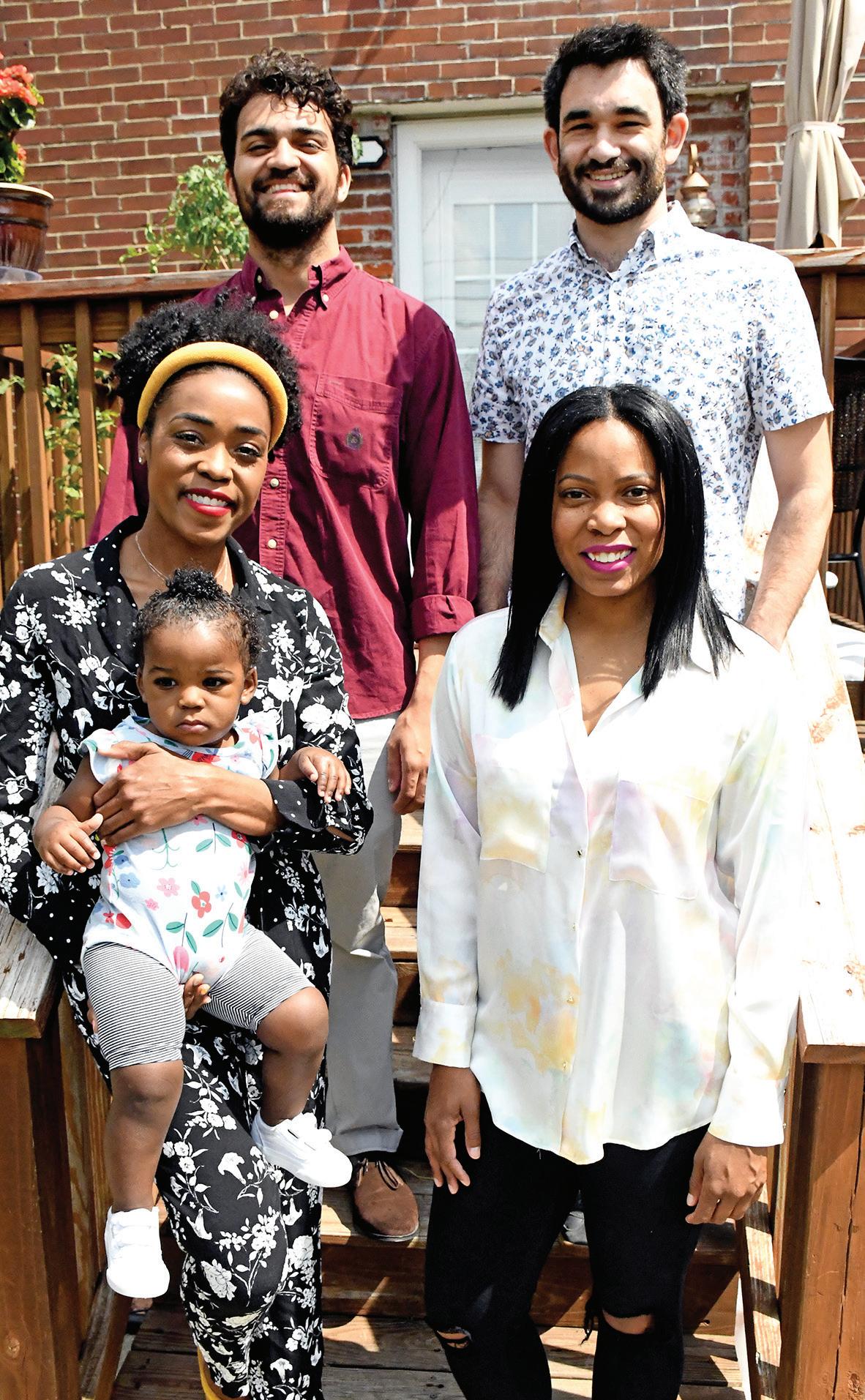
first time raising the capital, making the investment decisions and “operating the whole thing,” he said.
“We’re open to investing, without any equity stake,” Blumberg said, “or with an equity stake, where we would have a minor share in the company that then we would transition to community ownership in the long run.”
Blumberg and Cooksey concede there are a
MBDA budget could more than double
By Alvin A. Reid The St. Louis American
Black-owned
make the Minority Business Development Agency a permanent part of the federal government, according to Todd Gilyard, St. Louis MBDA project director.
“Since its inception, (the MBDA) has needed an executive order that is signed off by the president,” Gilyard said.
“We would now be permanent. We do not have to go back before Congress, get its approval, and then have the president sign off.”

Haynes joins Salvation Army Midland Division
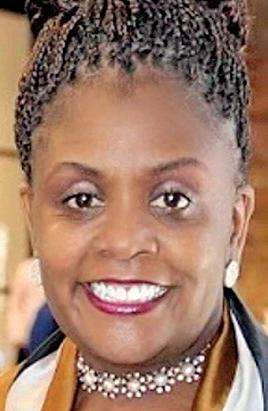
Lee Haynes is now the marketing and communications director at the Salvation Army’s Midland Division. Haynes joins after a five-year tenure as development director and marketing and communications manager for St. Louis’ Boys & Girls Clubs. She is a member of the newly created African American Giving Society. A graduate of Fontbonne University, she is a member of Alpha Kappa Alpha and The Links, Incorporated. She sits on the boards for the National Council on Alcoholism & Drug Abuse and the Tennessee Williams Festival.
CASA brings in Lingard as operations manager

CASA (Court Appointed Special Advocates) has named Rhonda Lingard operations manager. Lingard brings more than 25 years of professional experiences in corporate, non-profit and higher education to CASA. She holds a Bachelor of Science degree in Business Administration from Harris-Stowe State University and a Master of Science in Education from the University of Missouri-St. Louis, where she is also earning a Doctor of Education degree in Educational Practice. She most recently served as coordinator to the vice president for academic affairs at Webster University, joining the university after seven years of service as a coordinator of volunteer programs for CASA.
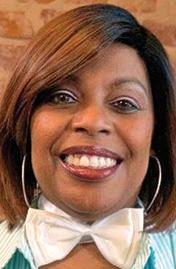
Erika Wilson promoted at Urban Strategies

Urban Strategies, Inc. (USI) announced that Erika N. Wilson has been promoted to communications and marketing director. Wilson will continue to oversee communications for the St. Louis area and throughout the country. She started at USI more than 10 years ago as a community services liaison serving Renaissance Place at Grand working with local residents. She has coordinated 300+ person conferences, told the important stories of residents, and continues to elevate the work locally and nationally. Wilson is the board chair of St. Louis ArtWorks and has served on the board for four years.


This is Bud. He likes to go on adventures with his friends in St. Louis. Now you can follow along with the Budget Bunny in our series of FREE Comic Books and Coloring Books.



Enhance the fundamentals of financial learning for your kids with these fun and free resources. Call (314) 317-6940 or email Bud@stifelbank.com or to request copies.
TEACHERS: Ask about resources for your class!
Watch Bud’s video and download digital books on www.StifelMortgage.com/FinancialLiteracy.html
Continued from A9
a work in progress.
Elevate/Elevar Capital is focused on businesses that already have a revenue track record, averaging from $60,000 to more than $1 million a year. Each selected business could reap an investment of up to $200,000.
WEPOWER has signed investment agreements for most of the $1.5 million, including a $500,000 investment from Living Cities, a coalition of 19 leading foundations and financial institutions that work together to fight poverty in U.S. cities.
Cooksey would like to see the fund grow to at least $15 million so that the nonprofit could be “more aggressive” with its investing.
WEPOWER is not alone in investing in entrepreneurs of color.
In March, banking giant Goldman Sachs, in partnership with Black women-led organizations, financial institutions and other partners, said it will commit $10 billion in direct investment capital over the next decade to address the “dual disproportionate gender and racial biases that Black women have faced for generations, which have only been exacerbated by the pandemic.”
San Diego-based Founders First plans to invest to help more diverse-led companies, and underrepresented founders grow their businesses and make it onto the Inc. 5000. Funding for this program was bolstered by a $1 million grant from the Rockefeller Foundation and Founders First Capital Partners’ recent $9 million Series A financing.
Still, Blumberg said he is aware of only a few other investment funds that involve the democratization of invest-
Continued from A9
The bill also could expand its national budget from $42 million to $110 million.
“This is great for minority owned businesses. It gives the MBDA more access to service and funding,” Gilyard said.
The bill’s pending approval comes as the St. Louis MBDA expands to service the state of Missouri, not just the St. Louis region.
Gilyard added that there has been “an ongoing effort” to make the MBDA a permanent fixture of the U.S. government, and the infrastructure bill will be a culmination of that work.
Established by The Nixon administration in 1969, the MBDA focuses on developing and advocating for minority-owned businesses. It is a division of the Department of Commerce. The agency has been required to ask the presiding U.S. president for new funding each year.
Ron Busby Sr., U.S. Black Chambers of Commerce president and CEO calls the bill “a win for us in a big way that may not necessarily be known by most people.”
The organization represents 143 Black chambers of commerce in America and more than 380,000 Black business owners in America, Canada and parts of Africa. Busby and other minority business representatives have been lob-


Consider buying your own home for about the same as your rent. Contact Terry to learn about qualifying for a mortgage today.
ing through community ownership.
One example of a group doing similar work is the Boston Ujima Project, which has a democratically managed fund, Blumberg said. There’s also the REAL People’s Fund in the Bay Area, “which is on our radar,” he said, adding, “we’re still looking into that.”
WEPOWER also hopes to see the community -- largely in Wards 3 and 21 including the neighborhoods near Hyde Park, Fairgrounds, and O’Fallon -benefit through employment opportunities in the fundbacked businesses.
“We work with some businesses that aren’t located in North City, and we ask them to commit to either locating there or prioritizing hiring people from this area,” said Blumberg. “That’s ...a step towards that ultimate vision of building a thriving business community in North City, that is ...creating living-wage jobs and generating returns that can be shared and managed with and by the community.
“Good quality, family-sustaining, living-wage job creation, with low barriers to entry -- [jobs that don’t have] a bachelor’s or a master’s as a requirement -- has been a priority for us from the beginning of our work involving entrepreneurship,” Blumberg added. “It is something we thought about in the design of the accelerator, as well as continue to think about in this new work with more direct investment.”
How will the fund ensure that the skill sets of the North St. Louis residents match the needs of the funded entrepreneurs?
“I think part of the answer is that we’re not exclusively focused on the types of companies that venture capitalists invest in,” he said. “We’re not exclusively focused on tech-enabled companies that need software engineers or life sciences
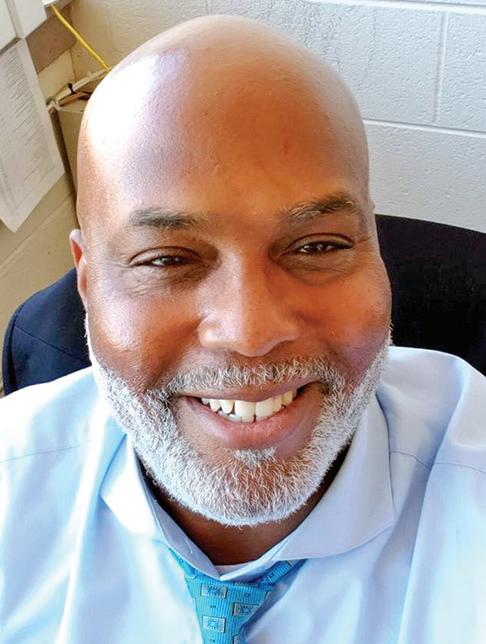
bying the Biden administration throughout the year to include provisions in the infrastructure package to help Black, Hispanic and Asian-American entrepreneurs.
The MBDA amendment would also expand the agency’s geographic reach by granting it resources to open regional offices and rural business centers. Those facilities would be administered through Historically Black Colleges and Universities and other minority-serving institutions, according to Sen. Ben Cardin, D, Maryland, and Sen. Tim Scott, R, South Carolina, who co-sponsored the amendment.
“We wanted to increase the resources going into this agency so we can get more entrepreneurship in minority communities,” Cardin told CNN Business.
“For our economy to perform at the level it needs to, we

and biotech companies that often need people with PhDs or master’s degrees.” That means investing in more low-tech companies, such as a coffee shop, or a business that focuses on natural beauty and wellness services -- jobs that often don’t pay enough to be truly living wage.
“So I think the thing we’re working on is threading the needle or finding ... jobs that can then grow to be living-wage and family-sustaining jobs,” Blumberg said.
“And so that includes a specific commitment to ... both people and place. And part of a commitment to people includes the commitment to paying living wages or putting people on a pathway toward living wages.”
Despite the challenges inherent in crafting a new ownership model, Cooksey said the team remains undaunted.
“I actually think this model is a lot easier, although it’s a lot more foreign, because community folks who are impacted by economic decisions finally get to decide how to use the resources and to support their best interests,” she said.
Added Blumberg: “We are interested in both worker and community ownership. We want to create a pathway to eventually get to partial community ownership of businesses, so a community fund (or funds) directly share in the profits of businesses in the community.
“We may not achieve that in this first pilot fund given the complexity involved,” Blumberg said. “But we intend to keep working on the concept regardless and hope to turn it into a reality.”
Karen Robinson-Jacobs is The St. Louis American / Type Investigations business reporter and a Report for America corps member.
Todd Gilyard, St. Louis Minority Business Development Agency project director, says President Biden’s $1 trillion infrastructure bill that the Senate passed last week “is great for minority-owned businesses.”
The bill could expand the MBDA’s national budget from $42 million to $110 million.
need everyone to have opportunity in this country.”
The Senate infrastructure bill’s MBDA amendment would also give financial assistance for both public and private sector development, provide additional grants to nonprofits that support minority business enterprises, and create a new program to promote entrepreneurship at HBCUs and MSIs.
The bill also includes provisions that would break up large infrastructure projects into smaller contract deals and allow minority-owned businesses to make exclusive bids on those projects to ensure greater racial equity, according to Busby.
Minority business owners have historically been systemically excluded from securing often lucrative federal contracts for infrastructure work, such as building bridges and highways, according to a 2016 MBDA report.
Progressive Democrats and House Speaker Nancy Pelosi have vowed not to support their own version of the measure unless it is coupled with a House version of the Senate’s $3.5 trillion budget resolution bill, which Democrats passed with a 50-49 party-line vote. House Democratic moderates have threatened to withhold support for the budget resolution until Pelosi allows a vote on the $1.2 trillion infrastructure bill.
It’s also an open question as to whether the infrastructure bill’s minority business proposals can survive both political and constitutional scrutiny, according to Busby.
“Yes, I believe it will be challenged, but that’s nothing new,” he said. “We’ve always been ready for the fight and many times we win the fight.”


Continued from A9
a work in progress.
Elevate/Elevar Capital is focused on businesses that already have a revenue track record, averaging from $60,000 to more than $1 million a year. Each selected business could reap an investment of up to $200,000.
WEPOWER has signed investment agreements for most of the $1.5 million, including a $500,000 investment from Living Cities, a coalition of 19 leading foundations and financial institutions that work together to fight poverty in U.S. cities.
Cooksey would like to see the fund grow to at least $15 million so that the nonprofit could be “more aggressive” with its investing.
WEPOWER is not alone in investing in entrepreneurs of color.
In March, banking giant Goldman Sachs, in partnership with Black women-led organizations, financial institutions and other partners, said it will commit $10 billion in direct investment capital over the next decade to address the “dual disproportionate gender and racial biases that Black women have faced for generations, which have only been exacerbated by the pandemic.”
San Diego-based Founders First plans to invest to help more diverse-led companies, and underrepresented founders grow their businesses and make it onto the Inc. 5000. Funding for this program was bolstered by a $1 million grant from the Rockefeller Foundation and Founders First Capital Partners’ recent $9 million Series A financing.
Still, Blumberg said he is aware of only a few other investment funds that involve the democratization of invest-
Continued from A9
The bill also could expand its national budget from $42 million to $110 million.
“This is great for minority owned businesses. It gives the MBDA more access to service and funding,” Gilyard said.
The bill’s pending approval comes as the St. Louis MBDA expands to service the state of Missouri, not just the St. Louis region.
Gilyard added that there has been “an ongoing effort” to make the MBDA a permanent fixture of the U.S. government, and the infrastructure bill will be a culmination of that work.
Established by The Nixon administration in 1969, the MBDA focuses on developing and advocating for minority-owned businesses. It is a division of the Department of Commerce. The agency has been required to ask the presiding U.S. president for new funding each year.
Ron Busby Sr., U.S. Black Chambers of Commerce president and CEO calls the bill “a win for us in a big way that may not necessarily be known by most people.”
The organization represents 143 Black chambers of commerce in America and more than 380,000 Black business owners in America, Canada and parts of Africa. Busby and other minority business representatives have been lob-
ing through community ownership.
One example of a group doing similar work is the Boston Ujima Project, which has a democratically managed fund, Blumberg said. There’s also the REAL People’s Fund in the Bay Area, “which is on our radar,” he said, adding, “we’re still looking into that.”
WEPOWER also hopes to see the community -- largely in Wards 3 and 21 including the neighborhoods near Hyde Park, Fairgrounds, and O’Fallon -benefit through employment opportunities in the fundbacked businesses.
“We work with some businesses that aren’t located in North City, and we ask them to commit to either locating there or prioritizing hiring people from this area,” said Blumberg.
“That’s ...a step towards that ultimate vision of building a thriving business community in North City, that is ...creating living-wage jobs and generating returns that can be shared and managed with and by the community.
“Good quality, family-sustaining, living-wage job creation, with low barriers to entry -- [jobs that don’t have] a bachelor’s or a master’s as a requirement -- has been a priority for us from the beginning of our work involving entrepreneurship,” Blumberg added. “It is something we thought about in the design of the accelerator, as well as continue to think about in this new work with more direct investment.”
How will the fund ensure that the skill sets of the North St. Louis residents match the needs of the funded entrepreneurs?
“I think part of the answer is that we’re not exclusively focused on the types of companies that venture capitalists invest in,” he said. “We’re not exclusively focused on tech-enabled companies that need software engineers or life sciences

bying the Biden administration throughout the year to include provisions in the infrastructure package to help Black, Hispanic and Asian-American entrepreneurs.
The MBDA amendment would also expand the agency’s geographic reach by granting it resources to open regional offices and rural business centers. Those facilities would be administered through Historically Black Colleges and Universities and other minority-serving institutions, according to Sen. Ben Cardin, D, Maryland, and Sen. Tim Scott, R, South Carolina, who co-sponsored the amendment.
“We wanted to increase the resources going into this agency so we can get more entrepreneurship in minority communities,” Cardin told CNN Business.
“For our economy to perform at the level it needs to, we

and biotech companies that often need people with PhDs or master’s degrees.” That means investing in more low-tech companies, such as a coffee shop, or a business that focuses on natural beauty and wellness services -- jobs that often don’t pay enough to be truly living wage.
“So I think the thing we’re working on is threading the needle or finding ... jobs that can then grow to be living-wage and family-sustaining jobs,” Blumberg said. “And so that includes a specific commitment to ... both people and place. And part of a commitment to people includes the commitment to paying living wages or putting people on a pathway toward living wages.”
Despite the challenges inherent in crafting a new ownership model, Cooksey said the team remains undaunted.
“I actually think this model is a lot easier, although it’s a lot more foreign, because community folks who are impacted by economic decisions finally get to decide how to use the resources and to support their best interests,” she said. Added Blumberg: “We are interested in both worker and community ownership. We want to create a pathway to eventually get to partial community ownership of businesses, so a community fund (or funds) directly share in the profits of businesses in the community.
“We may not achieve that in this first pilot fund given the complexity involved,” Blumberg said. “But we intend to keep working on the concept regardless and hope to turn it into a reality.”
Karen Robinson-Jacobs is The St. Louis American / Type Investigations business reporter and a Report for America corps member.
Todd Gilyard, St. Louis Minority Business Development Agency project director, says President Biden’s $1 trillion infrastructure bill that the Senate passed last week “is great for minority-owned businesses.”
The bill could expand the MBDA’s national budget from $42 million to $110 million.
need everyone to have opportunity in this country.”
The Senate infrastructure bill’s MBDA amendment would also give financial assistance for both public and private sector development, provide additional grants to nonprofits that support minority business enterprises, and create a new program to promote entrepreneurship at HBCUs and MSIs. The bill also includes provisions that would break up large infrastructure projects into smaller contract deals and allow minority-owned businesses to make exclusive bids on those projects to ensure greater racial equity, according to Busby.
Minority business owners have historically been systemically excluded from securing often lucrative federal contracts for infrastructure work, such as building bridges and highways, according to a 2016 MBDA report.
Progressive Democrats and House Speaker Nancy Pelosi have vowed not to support their own version of the measure unless it is coupled with a House version of the Senate’s $3.5 trillion budget resolution bill, which Democrats passed with a 50-49 party-line vote. House Democratic moderates have threatened to withhold support for the budget resolution until Pelosi allows a vote on the $1.2 trillion infrastructure bill. It’s also an open question as to whether the infrastructure bill’s minority business proposals can survive both political and constitutional scrutiny, according to Busby. “Yes, I believe it will be challenged, but that’s nothing new,” he said. “We’ve always been ready for the fight and many times we win the fight.”

“Who really cares, to save a world in despair…little children today are really going to suffer tomorrow.”
That is a prophet lyric in Marvin Gaye’s 1971 song, Save the Children
According to St. Louis Metropolitan Police Department statistics, nearly 60 children have been shot this year in St. Louis, 16 of them fatal. The city leads the nation in child murders. The year is not over, and we can expect more gun violence. We have the power to change the tragic situation we find ourselves in. The rest of the year could be dramatically different.
As much as I love me some Marvin Gaye, I reject his notion that ours is a world “destined to die.” Still, his compelling question must be answered: Who really cares? Who’s willing to try to save the world, to save the children?
Two years ago, then mayor Lyda Krewson offered $100,000 as reward money for the unsolved murder cases of four children. The ages of these innocent children ranged from 2 to 10 years old. I was critical of that action
because it reflected a shallow understanding of a deeper issue. Some saw it as a desperate attempt to address the out-of-control violence that has no mercy for its small victims. Others were offended by the tossing of dollars at a problem that requires genuine sensitivity and serious examination.
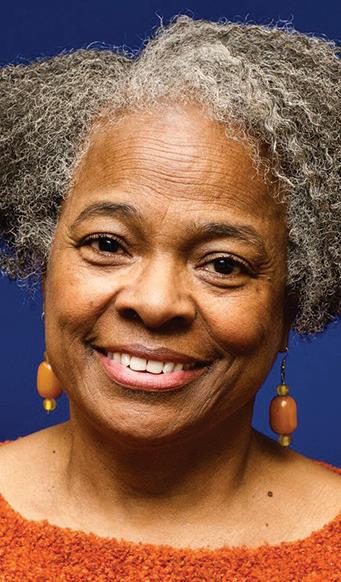
Columnist Jamala Rogers
The violence that has rocks this city must first be examined through the lens of humanity. Simply, Black people have the right to live. If that is believed, then comes the rest. This includes human rights. The right to decent housing. The right to a job with a living wage and safe working conditions. The right to a firstclass education. The right to a healthy state of body and mind. These rights are not universally accessible because of the racist belief that Black people are subhuman
and unworthy of a life free of trauma, discrimination, exploitation and violence. Unnecessary obstacles are put in place by racist institutions, laws, policies and behavior designed to maintain degradation and control.
If the 60 children who were hit by bullets were white, a state of emergency would have been declared. It’s all hypothetical because the relentless effort to keep Black people in their place was never meant for white people.
Black children are dying. Yes, the extreme finality of bullets is real and pressing. But they are also dying from lack of nutritional diets and accessible healthcare. They are missing opportunities for establishing quality lives because of inferior education. There are far too many obstacles in young lives that keep them from thriving and becoming healthy and whole adults.
We are adults with the power to make this world a better place for our children. If we really care, then let’s act like it. Act to save our children.



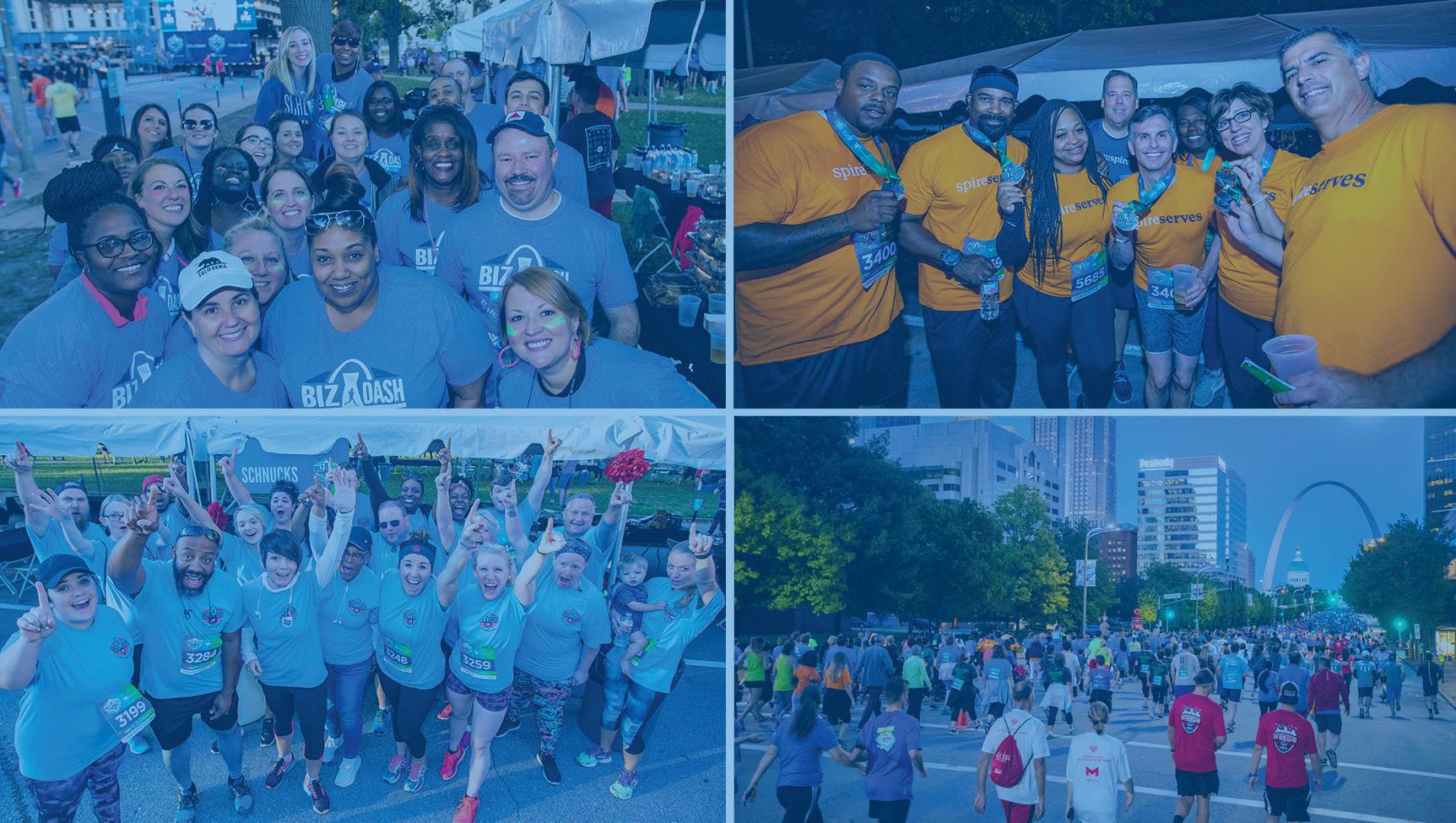








Oliver Lee Jackson is known for creating complex and layered images in which figurative elements emerge from abstract fields of vibrant color. Now on view, the 12 paintings, drawings, and prints presented in this exhibition were created from the mid-1960s through 2020, demonstrating his significance as a highly experimental artist working across a range of media.
Jackson was associated with the Black Artists Group, which was founded in St. Louis in 1968, and a close friend of comember and jazz saxophonist Julius Hemphill. Many of the works on view are loans from Donald M. Suggs, a local collector and close friend of Jackson’s.

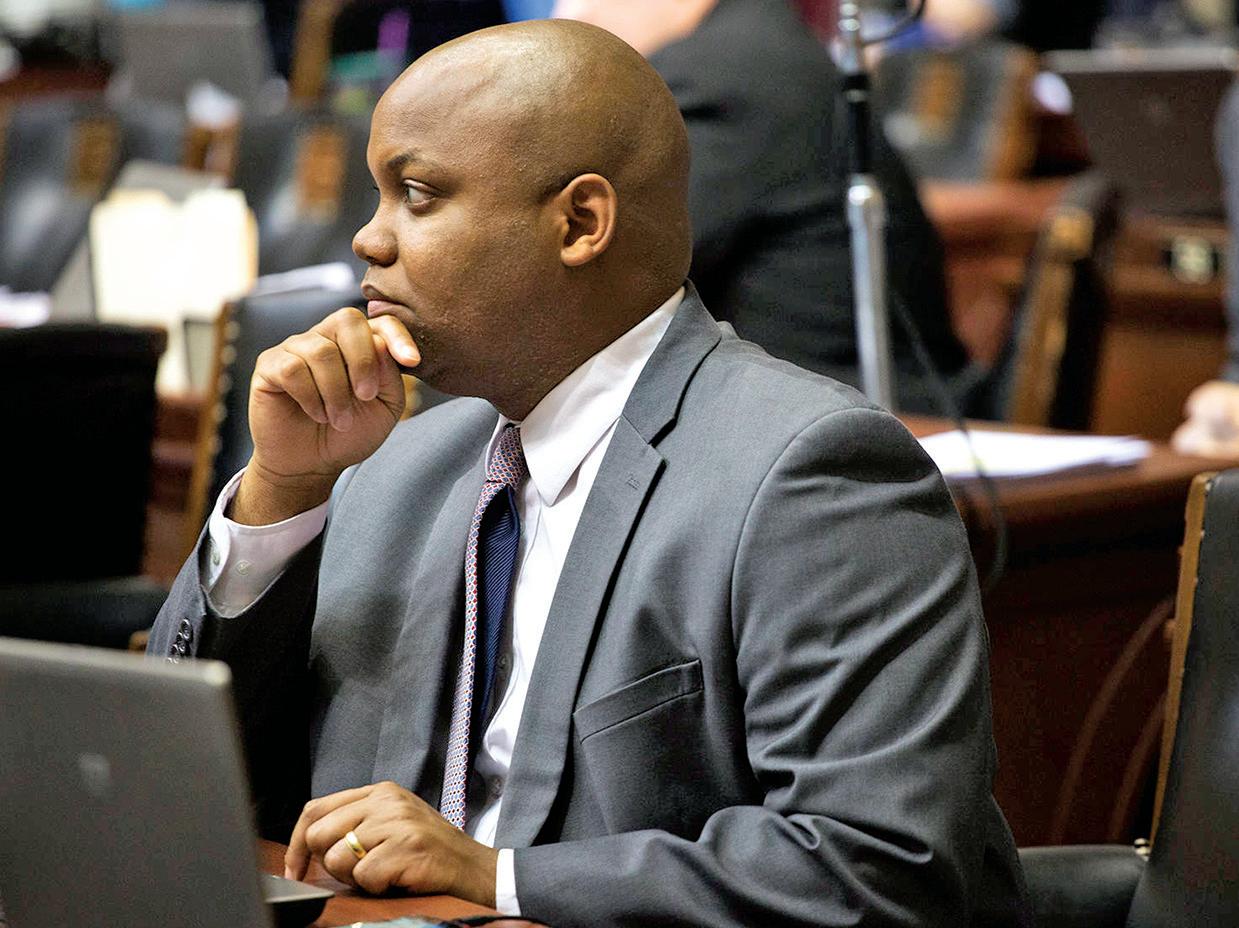
By Sylvester Brown Jr.
The St. Louis American
The COVID-19 delta variant established itself in rural Missouri and is now infecting thousands throughout the state, including St. Louis and St. Louis County. As of late July, nearly 30% of COVID-positive swabs were linked to the delta variant, according to local health officials.
Most vaccine-hesitant counties nationwide are rural, with low income levels and college graduation rates, according to a New York Times survey in July. Additionally, they are

Republican-leaning and, on average, people who voted to re-elect former President Donald J. Trump.
Another recent report by the Kaiser Family Foundation (KFF) found that Republicans are the most resistant to vaccinations. On average, nearly three in 10 say they don’t want it, with 35% of Republican men saying they definitely will not get vaccinated.
Republicans aren’t the only vaccine hesitant group in the US. African Americans and Latinos are also reluctant. But, according to the KFF survey, vaccination rates in those two groups have risen more sharply than among Republicans.
Health officials spent a lot of time and money trying to understand the rationale behind vaccine hesitancy among Blacks and Hispanics. Understanding those fears, without overt criticism or condemnation, paid off with higher vaccination rates. Therefore, if it’s par-
By Denise Hooks-Anderson Special to The St. Louis American
It’s that time of year again where our families participate in the tradition of back-toschool shopping.
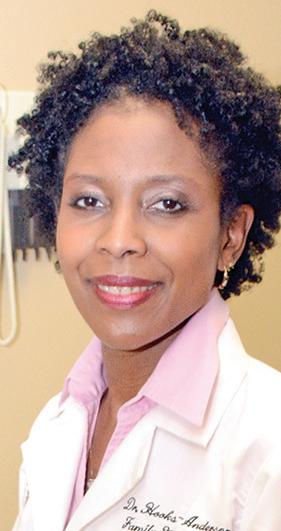
Denise HooksAnderson, MD
If your kids are like mine, they are requesting the latest tennis shoes. Girls want a trendy hairstyle, and boys want a fresh haircut. New backpacks, pencils and folders are also items typically found in shopping carts around this time. However, this year our carts should also contain hand sanitizer, disinfectant wipes and masks! Most kids dread the end of summer, but the excitement of being around their friends and the return of in-person events like fall dances and football games have changed the tenor of their chatter. The desire to return to some sort of normalcy is strong. So, with that in mind, let’s plan out a “wellness strategy” for our children during this pandemic.
n The rise of the delta variant of COVID is an important reminder that the pandemic is not over.
By now, kids and teens should have received an annual physical. If not, please schedule that immediately. Most kids cannot play a sport without a sports physical on file. These physicals review family history and measure the child’s/ teen’s BMI, blood pressure and weight. This is also a great time for the provider to screen teens for depression and alcohol, nicotine or drug use.
Maintaining an up-to-date immunization record is also important. For tweens and teenagers, Tdap, MCV (meningitis vaccine), and Gardasil (HPV vaccine) are the typical vaccines that are needed.
Starting in September, the influenza vaccine should be added to that list. Children 12 and older are eligible for the Pfizer COVID-19 vaccine and are encouraged to receive it for maximum protection.
Keep in mind that full protection against
say
By JoAnn Weaver
The St. Louis American
COVID-19 vaccine uptake among African American populations continues to lag in at least 40 states, according to a recent Kaiser Family Foundation Vaccine Monitor report.
The percent of white people who have received at least one COVID-19 vaccine dose (49%) was 1.2 times higher than the rate for African Americans (38%) in Missouri in early August. As of Aug. 14, 51% of Missourians have had at least one dose of the COVID-19 vaccine while 43% are fully vaccinated. In St. Louis, over 45% of St. Louis County residents are fully vaccinated with significant disparities across ZIP codes, according to public

Dr. Rachel Villanueva
health officials in early August. Parts of West County have about a 70% rate compared with about 35% in North County, which has a predominantly African American population.
The We Can Do This campaign hosted a live virtual press briefing on Aug. 11 where medical experts, including a trio of local doctors, provided COVID-19 vaccine information.

Dr. Michele Benoit-Wilson
Dr. Rachel Villanueva, clinical assistant professor of obstetrics/gynecology at the New York University (NYU) Grossman School of Medicine and National Medical Association
president, said, “It is important that we get the message out that the pandemic is not over. If you do not get the vaccine, the delta variant will find you because infections are escalating in unvaccinated individuals.”
Villanueva addressed why many African Americans are not getting vaccinated.

Dr. Cameron Webb
“We know that Black and brown communities have been subjected to an unequal healthcare system for many years, including barriers to access, implicit bias and structural racism,” Villanueva said.
“We know that many individuals distrust the
medical system because of poor treatment in the past, in addition to the community being subject to blatant misinformation that has caused doubt about the safety and effectiveness of these vaccines.”
The physicians discussed building confidence in the vaccines, the importance of getting adolescents and young adults vaccinated, and the delta variant. They stressed how safe the vaccine has been for pregnant women, which has been a topic of debate.
Dr. Michele Benoit-Wilson, an OB-GYN at WakeMed Health in Raleigh, North Carolina, said, “Our unvaccinated pregnant population is at risk. There has been no increased


By JoAnn Weaver
The St. Louis American
Siteman Cancer Center at Barnes-Jewish Hospital and Washington University School of Medicine in St. Louis plan to build a nine-story outpatient cancer care facility on the Washington University Medical Campus. It is scheduled to open in summer 2024.
“A lot of underserved patients from St. Louis, the city, the county and the surrounding metropolitan area, come to the Kingshighway campus,” said Timothy J. Eberlein, MD, founding director of Siteman, Spencer T. and Ann W. Olin Distinguished Professor and head of the Washington University Department of Surgery at the School of Medicine.
diagnosed patients, each year on its medical campus and five satellite facilities.
“This facility will be for all outpatient care performed on this campus, but we will still have our satellites, which are strategically located where we feel they can best serve the community,” Eberlein said.
n “We put a lot of time and effort into how we can meet the needs of our patients and their family members to make a better experience that efficiently supports them.”
– Timothy J. Eberlein
The facility will provide a home for nearly all aspects of advanced cancer care for outpatients, improving the experience and comfort for patients and their families. This includes a growing number of patients who travel from across the country and internationally for treatment.
“At this new facility, St. Louis residents will receive identical care to all of our other patients who come to us from all 50 states and internationally,” Eberlein said.
Siteman treats 70,000 people, including 12,000 newly
Continued from A12 amount to increase vaccination rates among Republicans, it seems necessary to study the source of their resistance.
“Actually, I think there’s a lot of overlap among some Republican hesitancy and African American hesitancy,” said state Rep. Shamed Dogan (R-Ballwin).
Dogan listed several reasons why fellow Republicans are resistant to rolling up their sleeves that are similar to justifications vocalized by Black people. They include religious convictions, mistrust of government and science, mixed messaging from health officials and what many consider bias against their beliefs.
Dogan, who has been vaccinated, said he’s doing everything in his power “both privately and publicly,” to convince fellow Republicans to get vaccinated. He defined some
Anderson
Continued from A12
Plans call for the ambulatory care center to include 96 exam rooms, 88 infusion pods, radiology and breast imaging services, and hematology and chemistry laboratory space. An elevated pedestrian link will connect the facility to the rest of the Medical Campus.
“The bridge will serve to connect patients to the advanced facility for radiation examinations and other procedures,” Eberlein said.
The new facility will be located next to a hotel for patients from out of town. Patients will also have access to the parking garage within the same building and to public transportation.
“This will make it easier for patients because they will be able to make fewer appointments along with more technological advances in the facility,” Eberlein said. The new building’s design will mean patients can get most of their care in one setting, with fewer visits to different locations on the Medical Campus.
GOP members as part of the “unreachable bucket,” such as those who have religious justifications for their stances.
“If they have a legitimate religious conviction, I’m not going to try to argue someone out of their faith,” Dogan said. However, he has little patience for the GOP segment influenced by social media misconceptions such as the virus being a hoax created by the government to implant chips in people, magnetize them, make them infertile or alter their DNA.
“First and foremost; more than 90% of doctors, medical professionals and frontline workers are vaccinated,” Dogan stressed. “People should trust their doctors more than their friends with doctorates from Facebook or Twitter.” Dogan said he focuses his attention on the “convincible crowd” who are open to facts over fiction.
“Those whose objections are more practical; those concerned about the safety of the

in summer of 2024 and will include 96 exam rooms, 88
and chemistry laboratory
Teams of cancer care specialists – incorporating the latest advances in the diagnosis and treatment of cancer – as well as support services from social workers, psychologists and others will come to patients in the new center. Patients also will have access to hundreds of clinical trials.
“Our patients are at the heart of everything we do, and we are putting great care into designing a cancer home that will be comfortable and easily accessible for patients and their family members,” Eberlein said.
vaccine or have legitimate concerns about some of the side effects that’s been reported …I think those people are very, very persuadable and can be reached.”
Inconsistent messaging from health officials is an additional impediment for some conservatives, including those who’ve been vaccinated, Dogan said:
“Since May, the CDC said you don’t have to wear masks; if you’re vaccinated; you’re protected. So, we have been operating under the understanding that our risks of catching or spreading COVID are far less. But it (CDC) responded to political pressure and changed its guidelines. When doctors change their advice and it’s not necessarily based on
Although the building’s design and construction details are being finalized – and final approval is pending – plans call for a 659,000-square-foot facility on the southwest cor-
science but based on politics, people lose trust.”
n “We have the tools that allow us to have a great, great chance of not going to the hospital or dying from COVID. So why not use them?”
– State Rep. Shamed Dogan (R-Ballwin)
President Joe Biden and health officials insist mask mandates have been altered based on science and the spread of the highly transmissible delta variant. But that justification does little to sway the perceptions of conservatives who sincerely believe that maintaining a robust economy outweighs public health concerns. If so-called “experts” can be wishywashy about health mandates, Dogan said, so can the American people.
His comment pertains to the tolerance or intolerance (depending on political leanings) of large-scale gatherings. For example, last year, after the murder of George Floyd
ner of Forest Park and Taylor avenues.
“As Siteman has continued to grow, we envisioned a setting that could accommodate more patients and additional cancer specialists, in an environment that allows us to continue to offer the highest quality, state-of-the-art outpatient care,” Eberlein said.
For two decades, Siteman’s
by Minneapolis police, some medical experts did indeed defend the rights of large groups of people gathering to protest injustice. Last year, Politico took health officials to task for placing “social justice” above “social distancing.”
“Now some of those experts are broadcasting a new message,” Politico wrote. “It’s time to get out of the house and join the mass protests against racism.” Dogan said the indifference and contradictions applied to the recent Lollapalooza music festival in Chicago’s Grant Park where an estimated 100,000 people gathered each day for the four-day event. The criticism wasn’t as robust, he insists, as it was for the early August Sturgis Motorcycle Rally, which drew an estimated crowd of 700,000.
If Chicago is all liberal and South Dakota is all conservative and there was no intermingling of the groups, then
main outpatient location has been the Center for Advanced Medicine, also on the Medical Campus, and the growing cancer center needs more space.
“We put a lot of time and effort into how we can meet the needs of our patients and their family members to make a better experience that efficiently supports them,” Eberlein said.
Dogan may have a legitimate point. However, perceptions matter and if conservatives (or liberals) believe a certain something, then facts or factbased rebuttals have little sway in their opinions.
Still, Dogan maintains that facts are key in trying to convince his vaccine-hesitant political compadres to change their minds.
“Developing the vaccine in record time, was a great American story; a testament to our ingenuity to fight a virus that originated in China. There were some hiccups in its delivery at first but now it’s almost 100% accessible to any adult who wants it.
“The COVID vaccine is way more effective than the vaccine for the common flu. We have the tools that allow us to have a great, great chance of not going to the hospital or dying from COVID. So why not use them?”
Sylvester Brown Jr. is The St. Louis American’s inaugural Deaconess Fellow.
the virus is two weeks after the second dose. Though the vaccine does not prevent the 12 and older population from getting COVID, it is our best protection between being moderately ill and dying from the infection. The rise of the delta variant of COVID is an important reminder that the pandemic is not over. If we want our children to continue to learn in the classroom, we must sustain our vigilance about infection precautions. It is imperative that we remind our children and teens about the proper way to wear their surgical or cloth masks. The mask should be worn over their mouth and should cover their noses. Please provide them with plenty of hand sanitizer for their backpacks. The most important reminder: IF YOUR CHILD/ TEEN IS EXHIBITING SYMPTOMS SUCH AS A FEVER, CHILLS, COUGHING, DIARRHEA, OR VOMITING, PLEASE DO NOT SEND THEM TO SCHOOL. Sending a sick child to school puts everyone else at risk. On another note, many of our children missed their typical birthday gatherings. However, please reconsider large gatherings that are indoors. You do not want to be known as the super-spreader parents! Lastly, children less than 12 need our help. At this time, this group cannot get the vaccine, therefore their only protection must come from the adults in their lives. If you have not gotten the vaccine, consider doing so for your kids or grandkids. Your decision could save their lives. So, as you prepare to send your kids to school, please prepare them appropriately. This year they need more than paper and pencils.
risk of miscarriage among women that have been vaccinated prior to pregnancy or in early pregnancy. We have also
seen no increased risk in fetal malformations or higher risk in pregnant women who have received the vaccine.” Dr. Cameron Webb, senior policy advisor for equity on the White House COVID-19 Response Team, said, “I think equitable opportunity includes
equal access to, and distribution of resources like vaccines, therapeutics and even COVID tests. It’s important for us to make sure we are having these conversations and share information to fight for equitable health programs to prevent health disparities.”
The delta variant is emerging as the dominant form of COVID-19 in the U.S., according to health officials in the briefing. “With this version of coronavirus, you get 1,000 times the normal viral load in the noses of individuals we are
swabbing for the virus, which is significant because it spreads faster and we see that it is infecting younger individuals who are getting sicker,” Webb said. The need to address this trend is crucial because of the recent rapid rise in COVID-19
Denise Hooks-Anderson, M.D., FAAFP is interim assistant dean of Diversity, Equity, and Inclusion and an associate professor with SLUCare Family Medicine.
infections and deaths, a sharp decline in vaccinations, the emergence of the more contagious delta variant, as well as the misinformation and myths that continue to persist about the virus, Webb added.

By Kathy Osborn President and CEO Regional Business Council
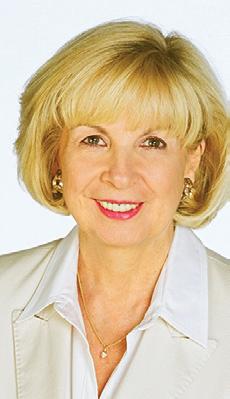
My phone pinged at 2 a.m. this morning and simply read “Belma has passed!” My immediate response was, “I had wondered how she would survive without Dr. Henry Givens, her dear husband of 60 years.” One of the sad occurrences among the COVID era is the passing of so many of St. Louis’ great Black Leaders who departed without the memorials, dinners, celebrations, and grand funerals they so justly deserved. We can’t let that go unnoticed and probably need a place where generations can come to pay homage, honor their greatness, and acknowledge the impact they had on St. Louis and the Civil Rights movement of their times. What was it about Jim Buford, Margaret Bush Wilson, Henry Givens, Betty Thompson, Frankie Freeman, Norman Seay and so many others of their generation? Well for me, they always seemed so dignified, noble, stylish, confident and determined. They were all undeniable voices for change, with talent to reach
across the great race and power divide to make things happen. As a young woman, I found them to be readily available and approachable. Voices for change for sure but also always including and educating others. Sometimes coaching from behind, asking for action that seemed like polite requests, but you always knew it had to be done.
When the honorable Betty Thompson passed last month, what I remembered most were her calls. “Kathy, it’s Betty Thompson.” I always knew whatever she wanted there was no escape. You
n It’s now my hope we all can continue to work across the racial barriers and not forget what these inspirational people and so many other Black leaders did for St. Louis.
said, “yes of course we can get that done!” Who can forget when Dick Mahoney, President of Monsanto, asked Margaret Bush Wilson to serve on the Monsanto Board? Revolutionary at the time and it changed everything. And years later she introduced him
to Marguerite Ross Barnett, the former chancellor of the University of Missouri-St. Louis and one of St. Louis’ great educational leaders, and brought her on the board as well. Perhaps not enough by today’s standards, but it slowly but surely changed corporate St. Louis.
Almost up until the day civil rights attorney Frankie Freeman, passed groups across the region who were tackling tough problems would say, “let’s get Frankie Freeman and Bill Danforth to take that on.” When the two of them got together, we all joined in as we knew they were always on the side of justice, goodwill, change for kids, and hope. What would St. Louis have been without that team?
So, it’s now my hope we all can continue to work across the racial barriers and not forget what these inspirational people and so many other Black leaders did for St. Louis. They inspired so many people like myself when they whispered in my ear, brought me in as a young person and said, “let’s go this way, let’s be better than we have been.”
I see that spirit in so many who grew up in that era and came since like myself. We can do this. We have an obligation to remember those who went before us and are with us today. Learn from them, join with them, and make them proud. I am ready, are you?
St. Louis American staff
A celebration of the life of Dr. Belma E. Givens will be held on Saturday, Aug. 21, 2021, at Central Baptist Church, 2842 Washington Ave., in St. Louis.
A public visitation will be held from 9 to 10 a.m., a memorial service will follow at 10:30 a.m.
Givens, wife of longtime Harris-Stowe State University president and civic icon Dr. Henry Givens, passed away last week. Her husband preceded her in death on July 20, 2021.
“With heavy hearts, we share with you the passing of Dr. Belma E. Givens,” the university said in a statement.
“Often referred to as his ‘backbone and quiet strength, Dr. Belma Givens met Dr. Henry Givens while a student at Lincoln University.”
They married shortly after graduation and would have celebrated their 66th wedding anniversary on Sept. 11, 2021.
“Her selfless, untiring, and steadfast support of this historic institution as the first lady for 32 years will be forever remembered, along with her contributions and all that she has done in bringing about the great successes of Harris-Stowe
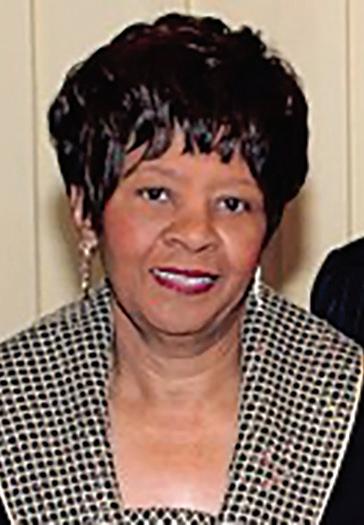
State University in support of President Givens.”
A St. Louis native, Dr. Givens was a product of the St. Louis Public Schools. She earned her baccalaureate degree (cum laude) in Business Education from Lincoln University and earned her teaching certification at Harris Teachers College.
Givens received a master’s degree from Webster University, where she majored in Education and Reading. She received
an honorary doctorate from Harris-Stowe State University in 2018.
Givens’ SLPS career began as a teacher, then as a reading specialist, and concluded as an administrator. She retired, with honor, in 1999 after 34 years of service.
Dr. Givens is survived by her daughter Stacey Givens Woolfolk, son Keith Givens (Vivian), and three grandchildren, Brittney Givens, Ashley Givens, and Jarrett Woolfolk. COVID-19 pre-registration is required for the funeral service. Visit https://form.jotform. com/askcentral/registration- to register.
A livestream broadcast of the service will be available on Zoom and Facebook. The Zoom meeting ID number is 279 619 4208. The Central Baptist Facebook page is assessable at CBCSTL.
In lieu of flowers, please donate to the Harris-Stowe Foundation Inc. ATTN: Dr. Henry and Belma Givens Scholarship, 3026 Laclede Ave., St. Louis, MO., 63103. All participants are asked to adhere to the church’s COVID-19 protocols during the services, which include mandatory face mask covering indoors.
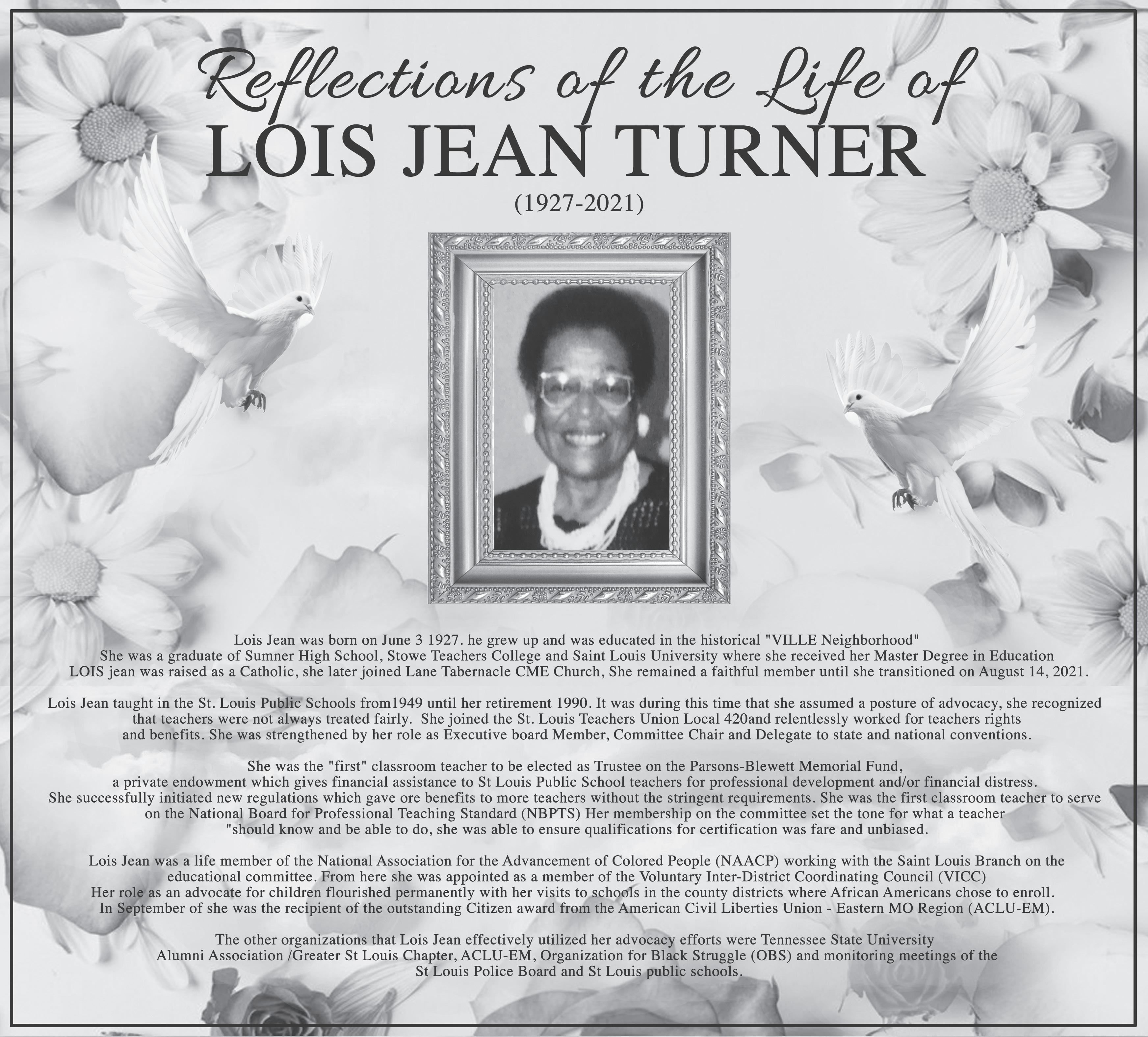

The St. Louis American
St. Louis leaders on Tuesday announced they are working together to welcome at least 1,000 Afghan citizens and will work with community partners to support any additional immigration to the region by Afghan families and friends to help with reunification.
St. Louis Mayor Tishaura Jones and St. Louis County Executive Sam Page issued a joint statement confirming the Department of Defense is in the process of evacuating at least 20,000 Afghan citizens through the Special Immigrant Visa (SIV) program.
“Over the last 20 years, these Afghan citizens fought alongside the United States during the war as translators, clerks, contractors, and community leaders,” Jones and Page wrote. This announcement came just days after the Afghan
government collapsed and the Taliban swiftly took control of the country.
On Monday, thousands of Afghan citizens could be seen swarming the Kabul airport, desperate to escape the Taliban.
President Joe Biden in April announced a formal withdrawal from the country by Sept. 11, extending the May 1 deadline former President Donald Trump negotiated last year with the Taliban.
Jones and Page said they have heard the community’s call to action to help these families and noted St. Louis has a long history of welcoming refugees and immigrants to the region. The region’s leaders noted that while the area provides a safe and secure new home for these people, they in turn offer skill, talent and culture that will enhance and enrich the community.
“This plan is consistent with
our collective goal to build a more welcoming and inclusive St. Louis region, no matter where they come from or any identity they hold,” the statement read.
Jones and Page are working with community stakeholders to build capacity and organize resources for the resettled families, noting this diverse public-private coalition is being led by the International Institute, the region’s largest refugee resettlement agency, which has extensive experience with resettling SIV holders.
“We appreciate the federal and state support thus far in our effort to help our Afghan neighbors,” they wrote. “In the coming weeks, we will be sharing the region’s call to action and how you can help make St. Louis the new home for these families seeking a better life as new Americans.”






By Danielle Brown
The St. Louis American
Leslie Hughes has desired to attend popular out of state festivals such as Essence Fest in New Orleans and Afropunk in Atlanta, Brooklyn and Paris.
Then, she thought of bringing a similar event to St. Louis.
“St. Louis is such an amazing place and this is where I’m from,” Hughes said. “We have super amazing people, talented artists, business owners and entrepreneurs here. Since I love this city so much it only made sense to bring [a festival] here to give my hometown something positive and uplifting to look forward to.”
What started as an idea to host a Black women’s brunch and panel discussion about hair care and concerns surrounding natural hair blossomed into something much bigger than her original plan.
Established in 2017, Frizz Fest, Hughes’ annual festival that celebrates beauty, hair care,
Travis Haughton’s TV series brings comedic relief to cultural appropriation
By Danielle Brown The St. Louis American
His peculiar interaction with a white student questioning if he would be considered Black by joining an all-Black student organization on Webster University’s campus inspired Travis Haughton’s current work, “Black Card.”
The event occurred during Haughton’s freshman year at Webster. He was heavily involved with the Association for African American Collegians, and was so immersed with the organization that many students assumed he was a board member. That wasn’t the case, he was just a member.
One day, an unknown white student approached him with curiosity about joining the
self-love, confidence, and unity, runs from 1-5 p.m. Saturday, Aug. 28 at Tower Grove Park. It operates under Hughes’ nonprofit, Frizzy By Nature, LLC.
“I remember the first one. I kept saying ‘if only my family and friends show up I’m good,’” she said.
“So many people showed up for the first event, and I was shocked. Then, to see how much it has grown from year-to-year, that’s how I know there’s a reason God gave me the vision to do something like this in St. Louis. People wanted it and they really enjoyed it.”
What would have been the festival’s fifth anniversary last year was halted due to the coronavirus pandemic. Instead, she hosted an in-person and virtual event ‘Walk The Walk’ in collaboration with Dear Fathers, a multimedia platform dedicated to celebrating fatherhood, brotherhood and mental health awareness among Black men.
“We actually pivoted to Walk the Walk. We were able to create an event on a smaller scale.


Photo courtesy of kranzbergfoundation.org
Artist Ronald Young’s exhibition “The Prevalence of Ritual,” is on display at The Kranzberg Arts Center by appointment on Eventbrite until Saturday, Sept. 4.
Ronald Young’s art exhibition explores African diaspora and concept behind power objects
By Danielle Brown
The St. Louis American Objects have power and meaning, and it can be felt in the work of artist Ronald Young. Young joined moderator Jade Powers, assistant curator of the Kemper Museum of Contemporary Art in Kansas City, in a discussion at The Kranzberg Arts Center on Aug. 14 about his exhibition “The Prevalence of Ritual.” It is on display by appointment on Eventbrite until Saturday, Sept. 4. His current body of work is a multidisciplinary exhibition that examines the idea of power objects, which is the spiritual belief that spirits exist in materials. Power objects derive from the collective consciousness rooted in African Americans with respect to Sankofa (an African custom that one must understand their past before moving forward).
The Tower Grove park still allowed runs and walks in the park because it was a safer way to gather than having so many people like we usu-

organization, but his way of doing it was rather odd. He posed the question, “If I join, does that mean I’m Black?” Then, a not so vocal Haughton was naturally taken aback by his comment. Instead of handling the matter himself, he raised the concern to board members. “I had to go back to the board members and get them to talk to him,” Haughton said. “So I don’t know what happened after that.”
One thing Haughton does know is that the strange interaction could make an interesting
Travis Haughton’s peculiar interaction with a white student questioning if he would be considered Black by joining an allBlack student organization on Webster University’s campus inspired Travis Haughton’s current work, “Black Card.”
concept for a feature film.
“The whole point of the story is that this white person wants to join the Black Student Union to become Black, but in reality this person can’t be Black ‘cause obviously you’re not Black and you won’t ever be Black,” Haughton said. In a script writing class at Webster, Haughton started developing the storyline
“We all have things that we’ve collected over the years that belong to relatives that have gone on and for whatever reason we cherish those objects,” Young said. “That object has been touched by that individual and because that object has been touched by that individual it has a spirit.”
The meaning behind that concept inspired Young to incorporate those beliefs into his craft after completing a residency in South Africa in 2019. Those very principles are apparent in his current pieces.
“The power objects as far as the African diaspora masks, Nkisi n Kondi (ancestry figurines) are the objects that have nails in them and the cause of these objects have a spirit,” Young said. “What I began to see is that when I was creating these objects the nails began to appear, they had a meaning to me because they were so strong and powerful.”
As Young started using the nails in part of his work, he wanted to create a narrative and realized that while crafting them his grandfather, too, used old tools. It was his responsibility to get them to him, in the process he played around with them.
“What I began to understand is when I was creating these pieces visually and I could hear him talk,” Young said.
His three anchor pieces “Gatekeeper,” “Knowledge of Self” and “Wake Up Every Morning (Tied to the Post),” each narrate different dynamics he felt were imperative to tell visually.
“Knowledge of Self” highlights his journey as an artist on how he’s grown from the past to now. It also relates to interesting travel adventures he’s experienced around the world in Japan and Africa.
“The pie symbol itself signifies when I was at a temple in Japan, how there was marking to enter the temple, that’s my version of its objects in the container with bones, thorns and other things I collected in Africa,” Young said. “We’ve all taken our individual journeys as people to learn something about ourselves.”
See ART, B8 n Power objects derive from the collective consciousness rooted in African Americans with respect to Sankofa.


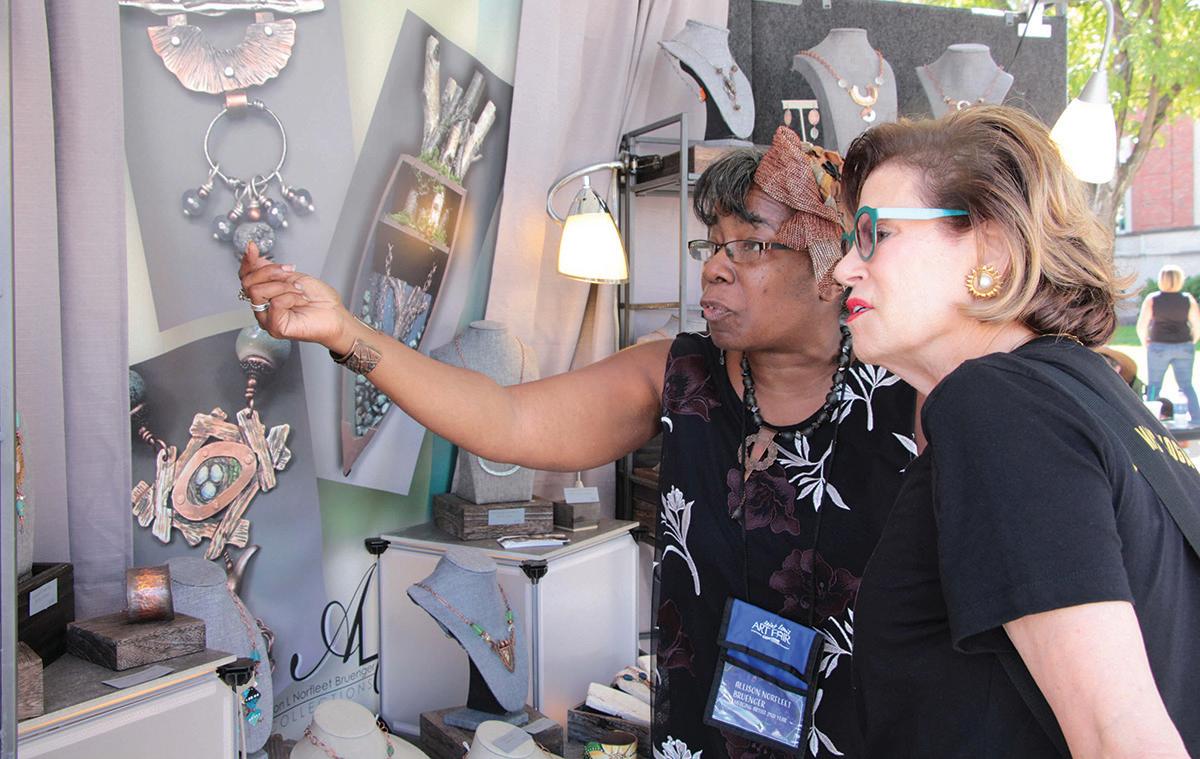
By Jennifer Poindexter
As summertime begins to wind down, and back to school will be ramping up, now is the perfect time to plan for a fun September to kick off the fall. There are so many familyfriendly activities in and around St. Louis this September, and festivals are a great way to enjoy quality time outdoors. With weather that’s usually not too hot and not too cool, make sure you save these dates to guarantee a spectacular September:
Japanese Festival - Sept. 4th - Celebrating the history, culture, and people of Japan, the Japanese Festival at the Missouri Botanical Garden is one of the largest and oldest festivals of its kind in the United States. The festival provides authentic Japanese music, art, dance, food, and entertainment for thousands of visitors each year.
Saint Louis Art Fair - Sept. 10th - If you want to see one of the best art fairs in the country, head to Clayton Business District for the annual St. Louis Art Fair. This three-day exhibition of visual and performing arts features the fine art works from 181 nationally recognized artists.
Taste of Black St. LouisSeptember 10-12 - Now hosted
at the City Foundry STL, the Taste of Black St. Louis showcases over 100 food, retail and information vendors. The festival will also include events such as chef battles, culinary demos, and endless fun supporting participating small businesses.
Music at the IntersectionSept. 10-12th - The inaugural Music at the Intersection will bring the music festival scene back to St. Louis. Over three days, the festival will feature more than 60 national, regional and local bands of all genres on six stages throughout the Grand Center Arts District. Headliners include Roy Ayers, Gregory Porter, and Lalah Hathaway. Weekend passes are on sale now.
Forest Park Balloon Glow - Sept. 17-18th - The Great Forest Park Balloon Race has been held for over 50 years—in fact, the organizers say, it’s the oldest, best-attended hot air balloon race in the world. Despite that international title, it’s one of our St. Louis–iest fall traditions.
HOP in the City Beer Festival - Sept. 18th - Every year, Schlafly Beer brews a ton of different beer styles. At HOP in the City, you can try over 40 of them. Purchase a tasting ticket to enjoy unlimited beer samples
at the biggest Schlafly party of the year.
Webster Jazz and Blues Festival - Sept. 18th - Non-stop jazz and blues music from two stages showcasing St. Louis’ most talented performers plus food and drink from area restaurants. There will also be street entertainers with face-painting, juggling and balloons.
SLSO Free Forest Park Concert - Sept. 22nd - Pack a picnic, grab a blanket and enjoy St. Louis Symphony’s FREE concert in Forest Park at 7 pm. The St. Louis Symphony Orchestra performs classical favorites at the base of Art Hill, closing with an impressive firework display. Invite your family and friends to join us for one of St. Louis’ favorite musical events of the year!
Taste of St. Louis - Sept. 24-26th - The Taste of St. Louis is back! The free event will feature 25 of St. Louis’ most diverse brick-and-mortar restaurants, live music & more at Ballpark Village.
With art fairs, music festivals, and many other activities in September, it’s important to start planning your adventures now! To keep up with the latest events, visit explorestlouis.com.

By Magdalene Linck, Missouri Historical Society
Murder ballads are an integral part of American folklore and music history. For years, songs inspired by true crime have captivated the public—and several of these crimes happened in St. Louis, including the murder that inspired the song “Stagger Lee.”
On Christmas night 1895, Lee Shelton, also known as Stack Lee, encountered William “Billy” Lyons at Bill Curtis’s saloon at Morgan and 11th streets, a largely Black, working-class neighborhood. The St. Louis Post-Dispatch gave this initial account: “They were drinking and arguing about politics. War was declared and Lyons was shot in the abdomen.”
The next day the Post-Dispatch suggested that Lyons’s death was retaliation for a different murder several years prior involving relatives of Lyons’s brother-in-law, Henry Bridgewater, a prominent and wealthy member of the Black community and the 400 Club, a Democratic organization.
On December 28, the St. Louis Globe-Democrat stated that a dispute over politics turned into a fight that included Lyons and Shelton throwing punches: “[T]he two men began striking each other’s hats. Lee grabbed Lyons’s derby and broke it. In return Lyons grabbed Lee’s hat”—a white Stetson that became part of the folklore.
Lyons died of a gunshot wound, and Shelton was taken into police custody and charged with murder. In mid-February he was indicted on a charge of murder in the first degree. The trial lasted less than a week.
After 22 hours of deliberation, the jury was unable to agree on a verdict and the trial was rescheduled. Shelton was released on bond to await his second trial.
During the second trial in May 1897, the courtroom erupted when a key witness, Henry Crump, recalled that he had accompanied Lyons to Bill Curtis’s saloon, where Lyons had pulled out a knife and started at Shelton—an account that went against Crump’s earlier statement. Both the prominent defense and prosecuting attorneys began shouting, and a deputy sheriff expected a fistfight. Order was restored, but the judge ended Henry Crump’s testimony—effectively suppressing witness testimony. The following day the jury returned a guilty verdict of murder in the
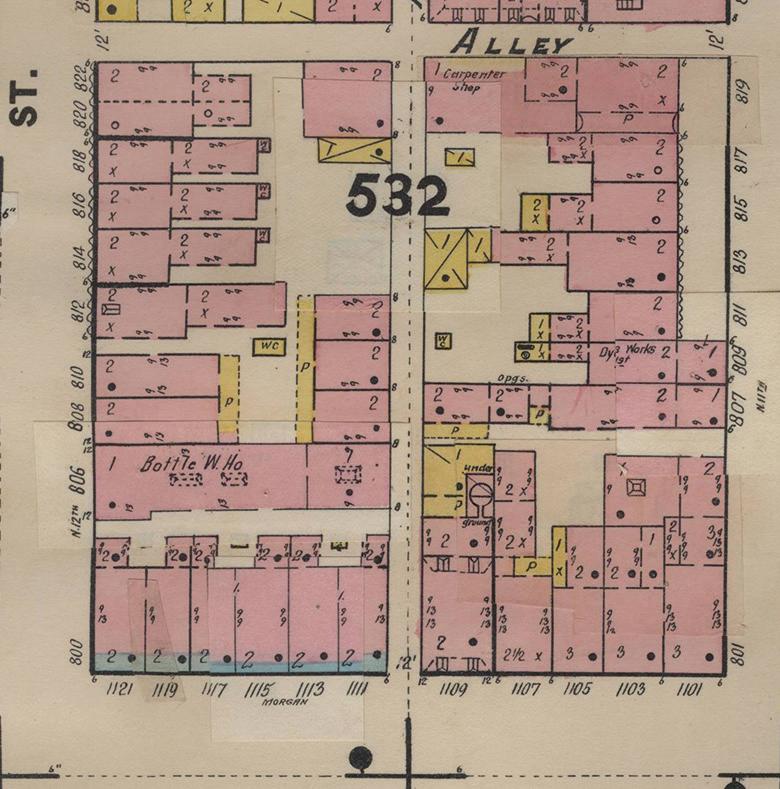
second degree after two hours of deliberation. Shelton was sentenced to 25 years at the Missouri State Penitentiary in Jefferson City.
While behind bars, Shelton was reprimanded a handful of times for petty theft and gambling, but his popularity in the outside world increased. When he entered prison, a song called “Stack-a-Lee” was already being performed in the Kansas City area. By 1899, several requests and petitions for pardon or parole had been filed on his behalf. One of the first petitions was signed by 139 St. Louis City residents, including club owner Tom Turpin, George and John Vashon, multiple witnesses to the shooting, and members of the 400 Club. Later petitions came from the sentencing judge, the defense attorney, 10 jurors from the second trial, Missouri congress members, the city jailer, and even the prosecuting attorney. Some noted the suppressed witness testimony, others pointed to possible political motivations and medical malpractice after Lyons was shot, and some merely supported a shorter sentence.
Shelton was released on parole on Thanksgiving Day 1909 but sent back to prison in January 1911 after being arrested for robbery. When Missouri governor Herbert S. Hadley granted him parole a year later,
it was because Shelton was terminally ill with tuberculosis. Shelton died in the prison hospital on March 11, 1912. His body was brought to St. Louis and buried in Greenwood Memorial Cemetery. Less than a mile away, Lyons is buried in the Bridgewater family plot in St. Peter’s Cemetery. The song “Stack-a-Lee” has lived on through popular music, portraying Shelton in many contrasting lights according to the times and the artist. It was first recorded by Fred Waring’s Pennsylvanians as “Stack-OLee Blues” in 1923. Lloyd Price’s recording, “Stagger Lee,” is the best known and hit number one on the Billboard Hot 100 in 1959. Other artists who have recorded the song include Mississippi John Hurt, Ma Rainey, Duke Ellington, the Black Keys, Nick Cave, James Brown, Taj Mahal, and more. Learn more about St. Louis’s contributions to popular music in the Missouri History Museum’s new exhibit, St. Louis Sound, opening Saturday, August 28. You’ll find familiar tunes, deeper cuts, and a new musical outlook on the city you love. Plan your visit at mohistory.org/visit.
This article was originally published on History Happens Here, the Missouri Historical Society’s blog.




By Earl Austin Jr.
The surge for a championship fell just short. But the St. Louis Surge of the Global Women’s Basketball Association closed another successful season.
The GWBA cancelled its season in 2020 due to the pandemic, but the Surge came back in 2021 with another stellar campaign that culminated in another appearance in the league’s championship game.
The Surge’s bid for its third GWB championship was spoiled by the Wisconsin Glo, who took a 93-77 victory over the Surge in the title game Aug. 15 at Fontbonne University. It was the Surge’s only loss of the season in 11 games. The Glo also captured the GWBA championship in 2019.

The Surge won titles in 2014 and 2016 while finishing as league runners-up in 2015, 2017, 2018 and 2019.
The Surge lit up the scoreboard on a nightly basis, averaging more than 100 points a game with six players averaging double figures.
The squad’s top player was veteran guard Rebecca Harris, who has been a staple of the franchise. A former Mascoutah High standout who also played at the University of Illinois, Harris is a scoring machine who has also piled up the rebounds and assists. She is a former GWBA Most Valuable Player award winner.
Along with Harris, the Surge again maintained a healthy dose of players from the St. Louis metro area. Included on this year’s talented team were Jaleesa Butler (Alton/Georgetown), Brittany Carter (Incarnate Word Academy/ Illinois) and Mikala McGee (Pattonville/Florida Gulf Coast). The remaining members of the team are Kristi Bellock (Texas A&M), Leah Cotton (Minnesota), Erin Bollmann (SEMO), Alexa Hart (Ohio State), Alesha Jenkins (South Florida) and Brianna Rollerson (Creighton).
Recruiting News

standout years at Chaminade College Prep. He led the Red Devils to consecutive Final Four appearances in the state tournament in 2020 and 2021, respectively. As a junior, Reed averaged 21 points, 11 rebounds and 2.6 blocks in leading Chaminade to a third-place finish in the Class 6 state tournament. He was named the St. Louis American Player of the Year for his efforts.
Senior Tarris Reed Jr., the top high school basketball player in the St. Louis area, will be taking his talent to the Big Ten Conference next season. The 6’10” Reed recently gave a verbal commitment to the University of Michigan, where he will play for head coach Juwan Howard. Howard was a star at Michigan as part of the famed “Fab Five” in the early 1990’s. Reed will be spending his senior season at Link Year Prep in Branson, Missouri., after three strike. It was “briefly mentioned” by longtime Pirates radio announcer Bob Prince and his partner Nellie King and just 11,278 attended the game in Pittsburgh’s Three Rivers Stadium.
During the summer grassroots season, Reed played for the MoKan Elite 17U squad, which played in the prestigious Nike Elite Youth Basketball League. He was one of the top players in the league, averaging 13 points and seven rebounds a game. He was named third-team AllEYBL.
A pair of standout football prospects in the Class of 2022 have recently given their verbal commitments. Chris Brooks of St. Louis University High has committed to Yale University while Caleb Merritt of John Burroughs has given a verbal pledge to Wyoming.
Merritt, a 5’11” 170-pound receiver, will be entering his fourth year as a starter for the Bombers. In five games last season, Merritt had five receptions for 317 yards and three touchdowns. He also rushed for 219 yards and two more TDs as a junior.
Brooks is a 6’2” 205-pound receiver who had a big junior season for the Jr. Billikens. In five
With Alvin A. Reid
games, Brooks had 20 receptions for 400 yards – a robust 20 yards per reception. He also scored six touchdowns.
On the girls’ basketball front, Westminster Christian standout Carlie Vick has given a commitment to Florida Atlantic. A 6’2” forward, Vick averaged 9.7 points and 6.9 rebounds to help the Wildcats to the Class 4 state quarterfinals.
Forward Azaria Moore of Vashon has given a commitment to SIU-Edwardsville. A 6’0” forward, Moore averaged six points and four rebounds to help the Wolverines to a third-place finish in the Class 4 state tournament.
The Pittsburgh Pirates did something that had never happened in the history of Major League Baseball on Sept. 1, 1971. This was five days before my 11th birthday. The nine Pirates starters were players of color. The 50th anniversary of this milestone is upcoming, and currently there are MLB teams that have NO Black players.
Dock Ellis, a 1971 AllStar who had thrown a no-hitter while under the effects of LSD on June 12, 1970, was the starting pitcher. Manny Sanguillen was catcher, and Al Oliver was at first base.
“I don’t think we even realized it until the second inning,” King told the Pittsburgh Press in 1986.
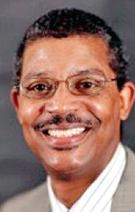
Alvin
Rennie Stennett played second base. Dave Cash, the team’s usual second baseman, played third base. Jackie Hernandez played shortstop. Gene Clines and future Hall of Famers Willie Stargell and Roberto Clemente played in the outfield. Sanguillen, Clemente, Stennett and Hernandez were Latino. According to history. com , you won’t find any mention in a Pittsburgh newspaper. Racism was not the reason. Both of its major newspapers were on
“We didn’t make a big thing about it on the air. We mentioned it, I’m sure, but we didn’t dwell on it.”
It should be noted that Prince, a flamboyant and opinionated broadcaster, “spoke Spanish, took many of the Pirates’ Black and Latin players under his wing, inviting them to his home and giving them advice on how to survive life as a major leaguer. One of those players was Clemente,” according to Prince’s Society for American Baseball Research biography. When the 40th anniversary of the historic contest was celebrated in 2011, Oliver told mlb.com that he and his teammates didn’t realize what was happening until well into the game.

“It really wasn’t a major thing, until around the third or fourth inning, and Dave Cash was sitting next to me and one of us said: ‘You know, we got all brothers out there, man,’ and we kind of chuckled, because it was no big deal to us,” he said.
“We really had no idea that history was being made.”
Pirates manager Danny Murtaugh told UPI after the game he could have cared less about the color of his players.
“When it comes to making out the lineup, I’m colorblind, and the athletes know it,” Murtaugh said.
“The best men in our
organization are the ones who are here. And the ones who are here all play, depending on when the circumstances present themselves.”
Ellis lasted less than two innings after the visiting Philadelphia Phillies hammered him early. Bob Moose, a white pitcher, replaced him.
The Pirates rallied to win 10-7. Clemente, Stargell and Sanguillen each drove in two runs. The Pirates would go on to win the World Series over the favored Baltimore Orioles, winning the final two games on the road.
Roberto Clemente was one of nine players of color who started for the Pittsburgh Pirates on Sept. 1, 1971. This was the first time it happened in Major League Baseball’s history. Clemente would become the first Latin player to win the World Series Most Valuable Player Award later that year.
Clemente capped the historic season by becoming the first Latin American player to win the World Series MVP Award.
The Reid Roundup
Donning a pair of trunks given to him by his late legendary grandfather Muhammad Ali Nico Ali Walsh defeated Jordan Weeks by technical knockout in his first professional bout on Aug. 14. “Obviously my grandfather, I’ve been thinking of him so much. I miss him.
He’s the greatest fighter who
induction into the Hall of Fame. Some possible features include a coffee shop, event and meeting space, and a bakery. The house has been vacant for decades and suffered extensive damage in a 2018 arson fire… With bi-partisan support, the U.S. Senate has passed a bill to award Willie O’Ree a Congressional Gold Medal. The bill will now go to the House for consideration. O’Ree became the NHL’s first Black player when he made his debut with the Boston Bruins in January 1958…There were at least 180 “LGBT” Olympic athletes competing in Tokyo, according to Outsports”three times more than the 56 openly out athletes at the 2016 Rio Olympics. American athletes who won medals include gold medal winners Sue Bird, Chelsea Gray, Brittney Griner, Breanna Stewart and Diana Taurasi of the USA women’s basketball team and shotput silver medalist Raven Saunders
By Adelle M. Banks Religious News Service
The Rev. Raphael Warnock, Georgia’s first Black U.S. Senator, urged the Progressive National Baptist Convention to keep fighting to protect voting rights as the historically Black denomination held its annual meeting.
“If we don’t check what they’re doing in Georgia, they’ll be able to nullify the votes and the voices of the people after they have already been cast,” Warnock said last week during his keynote speech at the virtual 60th
annual gathering.
“This is the delta variant of Jim Crow voting laws. The only inoculation is federal legislation and the only way that happens is for God’s people to stand up. So, thank you, Progressive, for standing up. Thank you for bearing witness to God’s love and God’s justice in the world.”
The PNBC is considered the “spiritual home” of the Rev. Martin Luther King Jr. and formed as a breakaway group from the National Baptist Convention in 1961 after the NBC opposed sit-ins and other civil rights
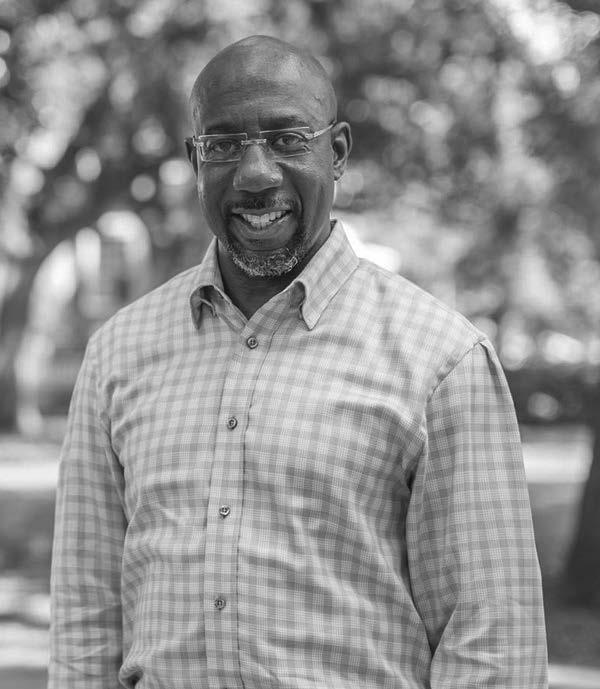
protests.
Warnock also is pastor of Ebenezer Baptist Church, a prominent Atlanta church where King once was a copastor. Prior to Warnock’s remarks, the denomination awarded former Georgia House minority leader Stacey Abrams its Freedom Award for her “unapologetic, unwavering, unyielding
as a kind of guide, as impossible as that might seem.
“Each one should use whatever gift he has to serve others, faithfully administering God’s grace in its various forms.” 1 Peter 4:10.
and undeniable courage in the face of extreme hostility to protect the voting rights of all people.”
The two other awardees were Jacqui Burton, president of the Conference of National Black Churches, and Harvard University historian Henry Louis Gates Jr., author of the new book “The Black Church: This Is Our Story, This Is Our Song.”
The denominational meeting featured discussions about social justice, including not only voting rights but concerns about equitable wages and debate over critical race theory.
“The minimum wage in 1968 had more purchasing power than the minimum wage in 2021,” said Warnock in his speech, noting how people who clean the floors of churches and hospitals have been deemed “essential” during the COVID-19 pandemic. “Well, if they are essential workers, somebody ought to pay them an essential wage.”
The Rev. Gabby Cudjoe Wilkes said Black Christians should not “drink the Kool-Aid of white evangelical theology” that may cause them to think they cannot emphasize their race as well as their religion. She and her co-pastor husband are leading an August sermon series, “Critical

I’ve got a question that maybe you have thought about.
We live a life filled with the devil’s attempts to have our souls reside with him. Once you claim your salvation, how should you live your life?
Once you’ve given your life to Christ, how should you live it? We’re not supposed to be able to earn our way into God’s presence on our own. His grace and Christ’s death basically took care of that for us. Whether you consider yourself a baby Christian or
a mature one, asking questions about faith and salvation are very necessary to living the “High Life.”
Since faith without works is supposed to be bogus, and simple faith won’t get you into the kingdom, then how should you approach this daily living thing? At this stage of my life, I believe every Christian comes to understand that he or she should ultimately live a life that honors God. Whatever that means to them. You can use Jesus’ life
You mean to tell me that I can “administer God’s grace” based on the gift given to me by Him? Now that’s an awesome thought; one that requires you to take ownership of your faith, your actions and indeed your soul. They say a person treats better something he owns versus something he rents.
Hence, to take ownership of one’s salvation requires a different approach to life than, say someone, who goes through the motions of life abdicating any responsibility for where he or she will spend eternity. That’s just being reckless.
Christians throughout history have been persecuted for living lives com-



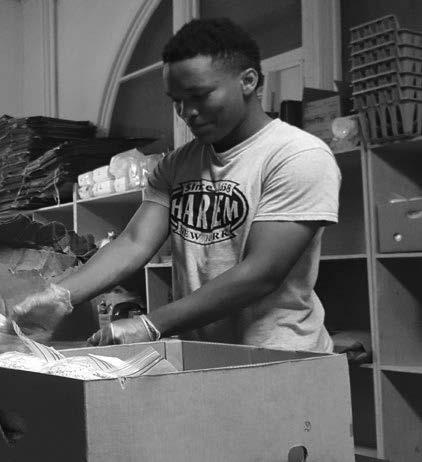




mitted to love, mercy and a quest for justice. You wouldn’t think that to be the case, but it is. “He showed you, O man, what is good. And what does the lord require of you? To act justly and to love mercy and to walk humbly with your God.”
Micah 6:8.
Okay so here is the answer to my question. God says, “Let all bitterness and wrath and anger and clamor and slander be put away from you, along with all malice. Be kind to one another, tender hearted, forgiving each other just as God in Christ also has forgiven you.” Ephesians 4:31-32. It sounds simple but we all know it’s not quite that easy. But it is clear. At times it can be downright dangerous to publicly claim and then live your faith. However, we don’t have the excuse to dismiss this and instead, live a life of gossip, revenge, pride,
Race Theory & Black Faith,” at their church, Double Love Experience, in Brooklyn, New York.
“Your identity as being a Black Christian says so much about our history,” she said. “And about what we have lived through and thought through and theorized through, and to still be Christian after what they’ve done to us, that is a bold and prophetic statement in and of itself.”
The Rev. Frederick Haynes III, a PNBC member, joined other Texas clergy outside the Supreme Court to protest its 2013 ruling that he said “gutted” the Voting Rights Act, freeing states like his “to do the dirt that they’re doing right now.”
The 2013 ruling invalidated a key provision of the Voting Rights Act, which was enacted 56 years ago, that would spur a mandatory Justice Department review of new voting regulations in states with a history of voting discrimination.
“Texas still needs to be under preclearance, because the children of the parents of those who did not want some people to vote,’” he said during the virtual conference, “are now in power, and they’re committed that not all people vote.”
worry and selfishness. It just doesn’t work that way for us. It should be okay to turn the other cheek, give the benefit of the doubt and respect another human being’s right to be different. Apparently, that’s part of God’s purpose for all of us. “Be on guard; stand firm in the faith; be men of courage; be strong. Do everything in love.” 1 Corinthians 16:13-14. That’s the goal. That’s how you live your life. But allow me to caution you about the renters. They have a marvelous way of convincing you that taking care of your own soul is unimportant. Building maintenance, the janitor will come along later and clean up the mess. The truth is you’re your own landlord and it’s your house. Keep it in order. Then you can receive guests at any time knowing that, by being true to yourself, you can be true to them. It’s God gift to you. May He bless and keep you always.


ASSISTANT SUPERINTENDENT DETENTION
Full time position at the St. Louis City Family Court Juvenile Division includes full benefit package, plus no cost retirement plan detailed info at www.stlcitycircuitcourt.com, click employment opportunities.
Check out www.helpingpeople.org for opportunities and next steps. Come work with us!
ASSET BUILDING COUNSELOR (SPRINGFIELD, IL) & BUSINESS ASSISTANT ASSOCIATE (STL, MO)
Justine PETERSEN, a Non-Profit focused on credit building, homeownership, and micro-enterprise lending and training is accepting applications for an Asset Building Counselor in the Springfield, IL area and a Business Assistant Associate in St Louis, MO. To apply go to justinepetersen.org/get-involved/ job-opportunities/ CLAYTON HAULING
DRIVERS NEEDED
Up to 10k monthly
or automatic
or
4+ months of experience
Please contact Ricky Clayton +1 (314) 337-1543
The St. Louis County Library is seeking qualified applicants to fill a Full-time Public Safety Specialist position. The Public Safety Specialist will work in a public library setting, ensuring a welcoming, safe and secure environment for employees, patrons, and the protection of library assets.
A High School diploma or GED required. A Bachelor’s degree or 60 hours college credit preferred. Threefive years of experience in security, social services, or related experience working directly with the public. Requires good interpersonal skills and excellent organization and communication skills. Salary$45,240 plus paid benefits. Apply online at https://www.slcl.org/ content/employment Equal Opportunity Employer.
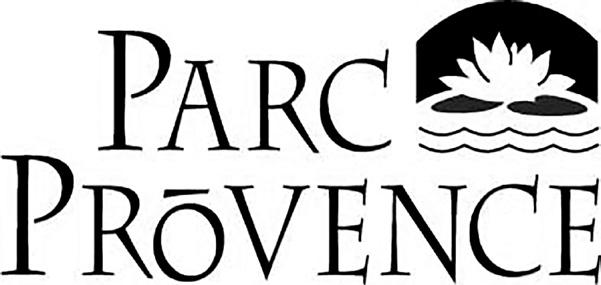
Parc Provence is hiring for the following positions: LPN’s C.N.A’s Servers Housekeepers Laundry Attendants Activities Assistants
*$500.00 sign on bonus*
Apply in person at 605 Coeur DeVille Dr. Creve Coeur, MO 63141 or online at Indeed.com
ADVERTISE YOUR JOB OPPORTUNITIES WITH US
EMAIL: ANGELITA HOUSTON AT ahouston@stlamerican.com
St. Louis County is seeking a skilled and service focused Auditor who is a strategic thinker and collaborative project manager to lead St. Louis County’s Internal Auditing program. Reporting to the St. Louis County Council, the Auditor will build on an internal auditing program that evaluates standards, identifies gaps and enhances performance of all departments within St. Louis County. Interested candidates should send a resume and cover letter to the Chair of the Charter Position Search Committee at CharterPositionSearchComments @stlouiscountymo.gov.
The City of Clayton is hiring for full-time Municipal Service Worker I for Public Works. Apply by 09/01/21: https://bit.ly/3wKAFyj EOE
Applications for the International Union of Elevator Constructors Local # 3 Joint Apprentice Training Program for St. Louis, Missouri will be accepted from Sept 1, 2021 through Sept 30, 2021. All applications must be completed online by visiting www.neiep. org/careers.aspx and clicking the link for All other Apprenticeship Opportunities. Select the (St. Louis/Missouri) recruitment.
Applicants must be 18 years of age to apply, possess and upload an original copy of a H.S. Diploma, or H.S.
and all qualified applicants will receive consideration without regard to race, color, religion, age (40 or older), sex (including pregnancy and gender identity), military/veteran status, sexual orientation, gender, national origin, status as an individual with a disability, marital status, arrest record, genetic information,


Maintenance Worker
CMA
lunch, hybrid office & work-from-home schedule. Reports to Scheduling Supervisor.
Responsibilities:
•Schedule meetings with clients and manage the calendars of multiple consultants (the heart of the job)
•Make travel arrangements.
•Prepare reports, agenda/meeting notes, etc. •Plan
great CMA experience.
•Some data entry.
•Other administrative project work and duties as assigned.
Excellent Benefits
•CMA pays health care premium 100% for employee.
•CMA pays health care premium 50% for dependents.
•Quarterly performance bonus eligibility after six months of successful tenure.
•Annual bonus after one year.
•Available to enroll in 401K after one year, with 25% match on contributions by CMA. •CMA pays for life insurance and provides for long-term disability insurance.
•CMA pays for parking space in covered parking garage. •2 weeks paid
Starting salary $30,684 + excellent benefit package
The maintenance worker performs routine, entry-level duties related to the maintenance of the state’s roadways and facilities. Responsibilities are performed under direct supervision.
Minimum/Required Qualifications:
• High School Diploma or GED
• Valid Driver’s License
• Class B Commercial Driver’s License (Permit) w/tanker endorsement - no air brake restriction
Locations: St. Louis city and county, St. Charles, Franklin and Jefferson County
• Medical Plan, Dental & Vision
• 13 Paid Holidays
• Paid CDL Class B training
• Life Insurance
• Paid Vacation
• Pension/Retirement
• Vested after 5 years
• Educational Assistance Program
• Cafeteria Plan
• Employee Assistance Program
• Voting Leave Apply: www.modot.mo.gov/careers
Increase Pay Market Adjustment for Winter/Emergency Operations!
MoDOT supports equality and advancement for all people based on their qualifications and actions alone without regard to color, race, ethnicity, gender, age, religion, national origin, or disability. EOE/AA/M/F/D/V
Bids for: State of Missouri, State Public Health
L a b o r a t o r y R e n o v a t i o n , Jefferson City, MO, Project No. O2115-01 will be received by FMDC, State of MO, UNTIL 1:30 PM, September 16, 2021. For specific project information and ordering plans, go to: http://oa.mo. gov/facilities
Bids for Replace Fire Sprinkler System, Northwest
M i s s o u r i P s y c h i a t r i c Rehabilitation Center, Project No. M2005-01 will be received by FMDC, State of MO, UNTIL 1:30 PM, Thursday, S e p t e m b e r 16, 2021 For specific project information and ordering plans, go to: http://oa.mo. gov/facilities
The Saint Louis Zoo seeks bids from qualified firms to submit proposals for the Sears Lehmann Jr. Wildlife Reserve Walk-In Freezer RFP 2021. Bid documents are available as of 8/18/2021 on the Saint Louis Zoo website: stlzoo.org/vendor.
The Saint Louis Zoo seeks firms to submit qualifications for the WildCare Park Architect of Record RFQ 2021. Request for Qualifications documents are available as of 8/18/2021 on the Saint Louis Zoo website: stlzoo.org/vendor.
The St. Louis Economic Development Partnership requests proposals for a qualified firm specializing in commercial real estate to provide brokerage and marketing services related to its offices, located in Clayton, Missouri, at 7733 Forsyth Boulevard, Suite 2200 (approximately 15,000 RSF) and 120 S. Central Avenue, Suite 1200 (approximately 12,000 RSF). A five percent bid preference may be available to certified MBE firms. A copy of the complete RFP is available at https://stlpartnership.com/rfp-rfq/ To be considered, proposals must be received no later than 3:00 PM CST on Thursday, September 9, 2021
Bids for Roof Replacement, M i s s o u r i Veterans Home, Mount Vernon Missouri, Project No. U2111-01 will be received b y F M D C , State of MO, UNTIL 1:30 PM, September 14, 2021. For specific project information and ordering plans, go to: http:// oa.mo.gov/ facilities
Bids for Upgrade F i r e A l a r m & S e c u r i t y Systems, Center for Behavioral Medicine, Kansas City, MO, Project No. M1903-01 will be received by FMDC, State of MO, UNTIL 1:30PM, September 9, 2021. For specific project information and ordering plans, go to: http://oa.mo. gov/facilities

EAGLE College Preparatory Schools in St. Louis is participating in a Free Breakfast and Lunch Program for the current school year (2021-2022). This alternative is referred to as the Community Eligibility Provision (CEP). All students enrolled at this school may participate in the breakfast and lunch program at no charge. Household applications for free and reduced price meals will not be collected.
Studies have shown that children who are not hungry perform better in school. By providing school meals to all children at no charge, we are hoping to create a better learning environment for our students.
The school breakfast and lunch that we serve follows U.S. Department of Agriculture guidelines for healthy school meals. The Free Breakfast and Lunch Program cannot succeed without your support. Please encourage your children to participate in the school meal programs.
If your children attend any EAGLE College Prep - St. Louis school, breakfast and lunch will be available to them at no charge.
Non-discrimination Statement:
In accordance with Federal civil rights law and U.S. Department of Agriculture (USDA) civil rights regulations and policies, the USDA, its Agencies, offices, and employees, and institutions participating in or administering USDA programs are prohibited from discriminating based on race, color, national origin, sex, religious creed, disability, age, political beliefs, or reprisal or retaliation for prior civil rights activity in any program or activity conducted or funded by USDA. Persons with disabilities who require alternative means of communication for program information (e.g. Braille, large print, audiotape, American Sign Language, etc.), should contact the Agency (State or local) where they applied for benefits. Individuals who are deaf, hard of hearing or have speech disabilities may contact USDA through the Federal Relay Service at (800) 877-8339. Additionally, program information may be made available in languages other than English. To file a program complaint of discrimination, complete the USDA Program Discrimination Complaint Form, (AD-3027) found online at: http://www.ascr.usda.gov/complaint_filing_cust.html, and at any USDA office, or write a letter addressed to USDA and provide in the letter all of the information requested in the form. To request a copy of the complaint form, call (866) 632-9992. Submit your completed form or letter to USDA by:(1) mail: U.S. Department of Agriculture, Office of the Assistant Secretary for Civil Rights, 1400 Independence Avenue, SW, Washington, D.C. 20250-9410;(2) fax: (202) 690-7442; or (3) email: program.intake@usda.gov. This institution is an equal opportunity provided

INVITATION TO BID Ferguson-Florissant School District
MCCLUER HIGH SCHOOL ROOF REPLACEMENT
Sealed bids for the above project are being requested from the Ferguson Florissant School District and will be received and publicly opened on Friday, August 27, 2021 at 1:00 PM CST at the Operations and Maintenance Department located at 8855 Dunn Road, Hazelwood, MO 63042. Bid specs must be obtained at: http://new.fergflor.K12.mo.us/ facilities-rfq Contact Matt Furfaro (314) 824-2418.
Notice is hereby given that The Metropolitan St. Louis Sewer District (District), the Owner, will receive sealed bids for Infrastructure Repairs (Rehabilitation) (2022) Contract A under Letting No. 13016-015.1, at its office, 2350 Market Street, St. Louis, Missouri 63103, until 2:00 PM, local time, on Friday, September 17, 2021. All bids are to be deposited in the bid box located on the first floor of the District’s Headquarters prior to the 2:00 p.m. deadline. Bids may, however, be withdrawn prior to the opening of the first bid. BIDS WILL BE PUBLICLY OPENED AND READ IMMEDIATELY AFTER THE BID DUE DATE/TIME AT 2350 MARKET STREET.
The Work to be performed under these Contract Documents consists of: The work to be done under this contract consists of the rehabilitation of approximately 58,428 lineal feet of sanitary sewers varying in size from 8-inches to 36-inches in diameter, utilizing cured-in-place pipe (CIPP) methods. The project is within the Metropolitan St. Louis Sewer District Boundaries, inside the city(ies) of St. Louis and various municipalities in St. Louis County and unincorporated St. Louis County in the State of Missouri. The work will be performed in various quantities at various sites.
All prospective bidders must prequalify in the Cured-In-Place Pipe (CIPP) category, and be certified prior to the Bid Opening. Prequalification forms for obtaining said certification may be obtained from the Owner at the above mentioned address. All bidders must obtain drawings and specifications in the name of the entity submitting the bid.
This project will be financed through the Missouri State Revolving Fund, established by the sale of Missouri Water Pollution Control bonds and Federal Capitalization Grants to Missouri. Neither the Missouri Department of Natural Resources, its divisions, nor its employees will be party to the contract at any tier. Any Bidder whose firm or affiliate is listed on the GSA publication titled “List of Parties Excluded from Federal Procurement or Non-Procurement Programs” is prohibited from the bidding process; bids received from a listed party will be deemed non-responsive. Refer to Instructions to Bidders B-27 for more information regarding debarment and suspension.
Nondiscrimination in Employment: Bidders on this work will be required to comply with the President’s Executive Order 11246. Requirements for bidders and contractors under this order are explained in the specifications.’
Plans and Specifications are available from free electronic download. Please go to MSD’s website and look for a link to “ELECTRONIC PLANROOM.” Plans and Specifications are also available for viewing or purchase at Cross Rhodes Reprographics located at 2731 S. Jefferson Ave St Louis, MO 63118. The Metropolitan St. Louis Sewer District is an Equal Opportunity Employer. The Metropolitan St. Louis Sewer District is an Equal Opportunity Employer and invites the submission of bids from Women and Minority Business Enterprises.
Notice To Small (SBE), Disadvantaged (DBE), Minority (MBE), Women’s (WBE), Service Disabled Veteran Owned (SDVOB) & Veteran Owned (VOB) Businesses Advertisement River City Construction, L.L.C., 6640 American Setter Drive, Ashland, Missouri 65010, (573) 657-7380 (Phone) (573) 657- 7381 (Fax) Is Seeking Qualified Small, Disadvantaged, Minority, Women’s, Service Disabled Veteran Owned & Veteran Owned Businesses For The University of Missouri Teaching Hospital– Fitout Space 2W (CP210701); Columbia, Missouri: for subcontracting opportunities in the following areas: asbestos removal, site work, demolition, rough carpentry, roofing, doors, glazing, painting, drywall, flooring, furnishings, specialties, air distribution, temp. control, plumbing, fire suppression, HVAC, electrical, communications, electronic safety. All interested and qualified SBE, DBE, WBE, SDVOB, AND VOB businesses should contact, in writing, (certified letter, return receipt requested) Joe Seymour or Jacob Petitt to discuss the subcontracting opportunities. All negotiations must be completed prior to the bid opening date 8/31/2021 @ 1:30 P. M. Proposals will be evaluated in order on the basis of low responsive bid received. CERTIFICATION OF DBE/WBE/MBE/SDVOB/VOB STATUS MUST BE SUBMITTED WITH BID. BID DOCUMENTS MAY BE OBTAINED BY:
1) Email your company name, contact name and phone number, as well as the project you are interested in to bid@rccllc.com
2) You will then receive an email invitation for that project with a link to our SmartBidNet system.


Notice To Small (SBE), Disadvantaged (DBE), Minority (MBE), Women’s (WBE), Service Disabled Veteran Owned (SDVOB) & Veteran Owned (VOB) Businesses Advertisement River City Construction, L.L.C., 6640 American Setter Drive, Ashland, Missouri 65010, (573) 657-7380 (Phone) (573) 657-7381 (Fax) Is Seeking Qualified Small, Disadvantaged, Minority, Women’s, Service Disabled Veteran Owned & Veteran Owned Businesses For The University of Missouri – Patient Care Tower – Pharmacy Renovation, (CP210781) Columbia, Missouri: for subcontracting opportunities in the following areas: demolition, concrete, metals, rough carpentry, roofing, doors, glazing, painting, drywall, flooring, specialties, furnishings, fire protection, air distribution, control systems, HVAC, plumbing, electrical, communications, electronic safety. All interested and qualified SBE, DBE, WBE, SDVOB, AND VOB businesses should contact, in writing, (certified letter, return receipt requested) Jason Brown or Joe Seymour to discuss the subcontracting opportunities. All negotiations must be completed prior to the bid opening date 8/11/2021 @ 1:30 P.M. Proposals will be evaluated in order on the basis of low responsive bid received. CERTIFICATION OF DBE/WBE/MBE/SDVOB/VOB STATUS MUST BE SUBMITTED WITH BID.
BID DOCUMENTS MAY BE OBTAINED BY:
1) Email your company name, contact name and phone number, as well as the project you are interested in to bid@rccllc.com
2) You will then receive an email invitation for that project with a link to our SmartBidNet system.
Invitation for Bids - Re-solicitation of RD21-02A Clinton-Peabody Unit Water Damage Repairs
The St. Louis Housing Authority seeks bids from qualified general contractors for the following:
The project consists of interior renovations, including demolition, mold abatement, drywall, painting, flooring, and carpentry, along with electrical, plumbing and mechanical work for twenty (20) water damaged units.
Bid information will be available August 15, 2021 at https://www.slha.org/for-partners/vendors/.
Pre-Bid Meeting is August 31, 2021 at 10:00 AM (CST)
Sealed proposals are due September 16, 2021 at 3:00 PM (CST)
Krista S. Peyton Contracting Officer AN EQUAL OPPORTUNITY EMPLOYER
Saint Louis MHB is accepting applications August 16 –September 10, 2021 from qualified candidates with experience in executive level administration and grants management. Details available on our website https://stlmhb.com/wp-content/ uploads/MHB-Executive-GrantAdministrator-Position-Posting.pdf
Alarm System,
Rehabilitation Center, Project No. M2001-01 will be received b y F M D C , State of MO, UNTIL 1:30 PM, September 16, 2021. For specific project information and ordering plans, go to: http:// oa.mo.gov/ facilities
Sealed Proposals for B22-1203 Employee Benefits Insurance Broker and Consultant will be received at Lincoln University Purchasing Dept 1002 Chestnut St, RM 101 Shipping & Receiving Bldg, JCMO 65101 until 2PM CT on 31Aug2021. Download Proposal Request at http://www.lincolnu.edu/web/ purchasing/bids


Paric Corporation is seeking proposals for the following project: Missouri Teaching Hospital Fitout Space 2W for the University of Missouri in Columbia, MO.
This is the renovation of the 2nd floor of the Teaching Hospital. The project consists of approximately 4,500 SF of space and includes but is not limited to demolition, carpentry, architectural woodwork, fire stopping, Doors/frames/hardware, drywall, tile, acoustical ceilings, flooring, painting, fire sprinklers, plumbing, HVAC and electrical work.
This project has a diversity participation goals of 10% MBE, 10% combined WBE, DBE, Veteran Owned Business and 3% SDVE.
Bids for this project are due on August 30, at 3:00 p.m. For any questions or would like to find out more detailed information on this opportunity, please contact John Davis at 314-704- 6075 or jcdavis@paric.com.
All bids should be delivered to Paric via e-mail (bids@paric.com) or fax (636-561-9501).
PARIC CORPORATION IS AN EQUAL OPPORTUNITY EMPLOYER
INVITATION TO BID
ST. LOUIS COUNTY
CHILDREN’S SERVICE FUND
The St. Louis County Children’s Service Fund (CSF) is requesting bid proposals for legal services. The selected firm will act as general counsel for CSF. Seeing firms with a particular emphasis in municipal law. Bid documents available at https://bit.ly/3sfVct8 bid #1383. Bids are due by 11 AM, September 24, 2021




behind his comedic feature “Black Card.” However, instead of using himself and his white male counterpart as the film’s muses, he incorporated a Black woman and white woman as leads.
“I was like, this would be a dope idea, and I could add some twists and turns into it of course to make it into an interesting story,” Haughton said.
“I decided to write it from the female’s perspective versus male because of movies that are already out and you see more women appropriating the culture than men.”
His senior year was the time he planned on executing it, but when the COVID-19 pandemic came into play, he realized that wasn’t feasible.
Now a Webster graduate, Haughton is transitioning his feature film script into a television series. He plans to release a proof of concept (a promo or trailer of the series) next month to get people engaged before it releases potentially at the end of this year.
“I thought it would be dope to change it into a TV show because I can develop the characters more, and develop the story more than with a feature film where people will watch it and leave. I want you to go through the journey with each and every one of the characters, even the white character.”
Although the series discusses the controversy and severity surrounding the appropriation of Black culture, he wants it to make people laugh while also educating them.
Without revealing too much of the series’ synopsis, Haughton said a “Black Card” constitution comes into play with the plot, where comedic steps are implemented to demonstrate how one can get involved with the Black community.

“The Black Student Union plays a game on the white girl and tells her how she can be Black,” Haughton said. “She has to go to a Black church, a Black cookout, and each time she finishes one of the steps she levels up to the next constitution.”
The major word of advice Haughton gives to white people curious about Black culture is to do their research and ask questions.
“A lot of people just see somebody doing something, but they don’t know what it means,” Haughton said. “Do your research and also ask questions. You can’t just go into doing something and not know what you’re getting yourself into. Then, the next thing you know you get posted on The Shade Room ‘cause you’re appropriating the culture and not realizing what you’re wear-
ing, what it means.”
Haughton said he wants his audience to look at his project as a ‘Black Mean Girls.’ He wants it to differentiate the difference between appropriating the culture versus appreciating it.
“This is my story to tell and I just wanna make sure I tell it in my perspective and people can take it however they want to take it,” Haughton said.
“But at the end of the day I’m educating and I want you to know that there’s a difference between appropriating the culture and appreciating the culture.”
Stay updated on Haughton’s productions via his website, www.atravisproduction.com or follow him on Instagram at https://www.instagram.com/ taughtbyt/.
Continued from B1
ally do.”
Frizz Fest returns to its normal in-person operation this year. Typically, Hughes and her “small but mighty” team including her brother, Ricky Hughes, and his wife, Valerie Hughes, assist her with planning and preparation. Its blueprint usually begins as early as January, although it started later this year as they awaited confirmation from the city that the event could take place.
Once Fizz Fest received approval in June, Hughes admits the organizing was rushed compared to its normal rollout.
“It’s been a rush but everything has come together like it normally does and we’re just excited to pull it off this year.” she said.
This year Frizz Fest has about 25 vendors, the most in its history. Almost all are local, small Black-owned businesses displaying body care, jewelry, clothing, nail polish, art, adult coloring books, hair care products, art and other products. There will also be a variety
of food vendors and food trucks on sight. For the first time, adult beverages will be available, through local brewery 4 Hands Brewing Co. Alonzo Townsend, founder of TownsendX3 Agency LLC Artist Management and son of famed Blues legend Henry Townsend, will oversee the festival’s music and entertainment. R&B vocalist Lydia Caesar, Blues singer Little Dylan and saxophonist Rhoda G will grace this year’s stage. DJ Nico Marie will DJ the event’s music set. There will also be numerous activities for children, including free pony rides.
“I really invite families to bring your kids out because it’s important for our Black children to see Black people in a positive light; especially since St. Louis gets a bad rap a lot of times,” Hughes said. “This showcases that’s not the full trajectory of who we are.”
St. Louis mayor Tishaura Jones is scheduled to speak and Alderwoman Shameem Clark-Hubbard will discuss The CROWN Act (Creating a Respectful and Open World for Natural Hair). This is the law that prohibits race-based hair discrimination in the workplace and educational institutions.
“I’m really excited about our really amazing community leaders believing in the mission of Frizz Fest,” Hughes said. While the festival has always had sponsorships from natural hair care providers, this year will mark the first time a brand representative will attend. A representative from Mielle Organics will have a booth providing information about their products and giving out samples.
“The festival has grown so much,” Hughes said.
“We have so many exciting additions that we’ve incorporated this year. It keeps us motivated that we’ve created an event that is necessary and needed here within the Black community in St. Louis.
“We really want the community to come out and support this amazing event so that we can continue pouring back into the community that we love so dearly and that is so close to our hearts.” she said.
There is a $5 admission fee, and registration is required through the Eventbrite app. All children 15 and under are free. For more information about Hughes and her festival, visit her website: https://frizzybynature.com/.
“Gatekeeper” is a fictional character modeled after animals he saw on a game reserve in South Africa.
“Gatekeeper is a culmination of materials and it’s the essential object you transfer in order to get into the rest of the exhibition,” he said.
“Wake Up Every Morning (Tied to the Post)” represents everyone’s current circumstances whether they work or have other responsibilities. Young said usually those things are positive. But he decided to dive deeper into the topic by looking at it from the perspective the unhoused population.
“Every time I travel, I see someone who is homeless,” he said. “Beyond that, when a person is homeless, their family is homeless. We often don’t see it that way. For the piece I connected building blocks and toys to signify children also being homeless if their caretaker is. The work is about the dysfunctional things I see in society.”
Young not only relied on elements he discovered in Africa’s natural habitat for the
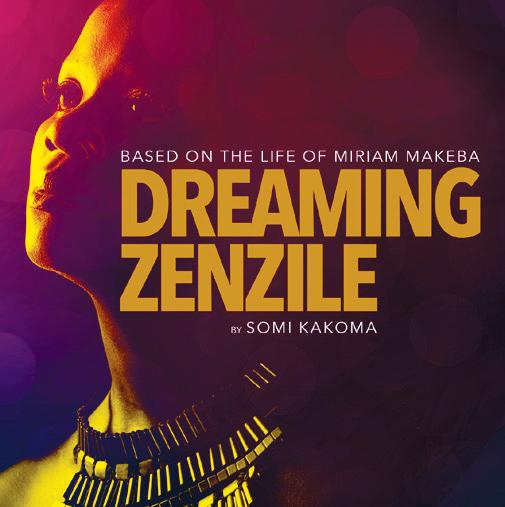





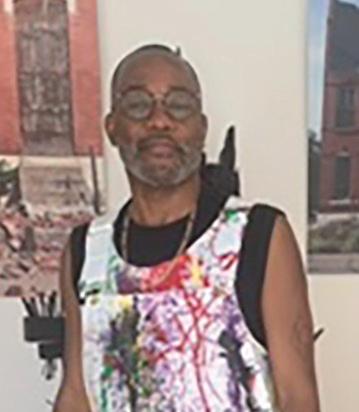
figuring out the juxtaposition of every component in the exhibit, but he thought it made more sense to allow the materials to dictate their own narrative.
“When I started the assemblages the materials dictated the narrative,” Young said. “When I would go out in the community and find these objects literally I would take them back into my studio and I had to let them dictate which way they wanted to go. Especially with the charred wood because a lot of the bottom stuff is fragile. Everything was trial and error even with the African masks, I had to let the ropes and chains create this movement experience from South Africa.”
exhibit, he also found usage in items he saw while riding around in north St. Louis city.
“I’m seeing these deteriorating buildings and knew what I saw but I didn’t have a name for it,” Young said. “I learned that there were brick thieves — which were individuals who stole bricks from those buildings and they had developers who’d purchase them and use them for homes in southern states.”
Young said he experienced a lot of push and pull while
While curating the exhibition he realized it was likely that no one but him would conceptually understand the meaning behind it all.
“I had already built what it was gonna look like,” Young said. “In curating the show I knew certain things were gonna be in certain places and it came together organically.”
For more information about the exhibition visit https://www. kranzbergartsfoundation.org/ events/ronald-young-the-prevalence-of-ritual/.
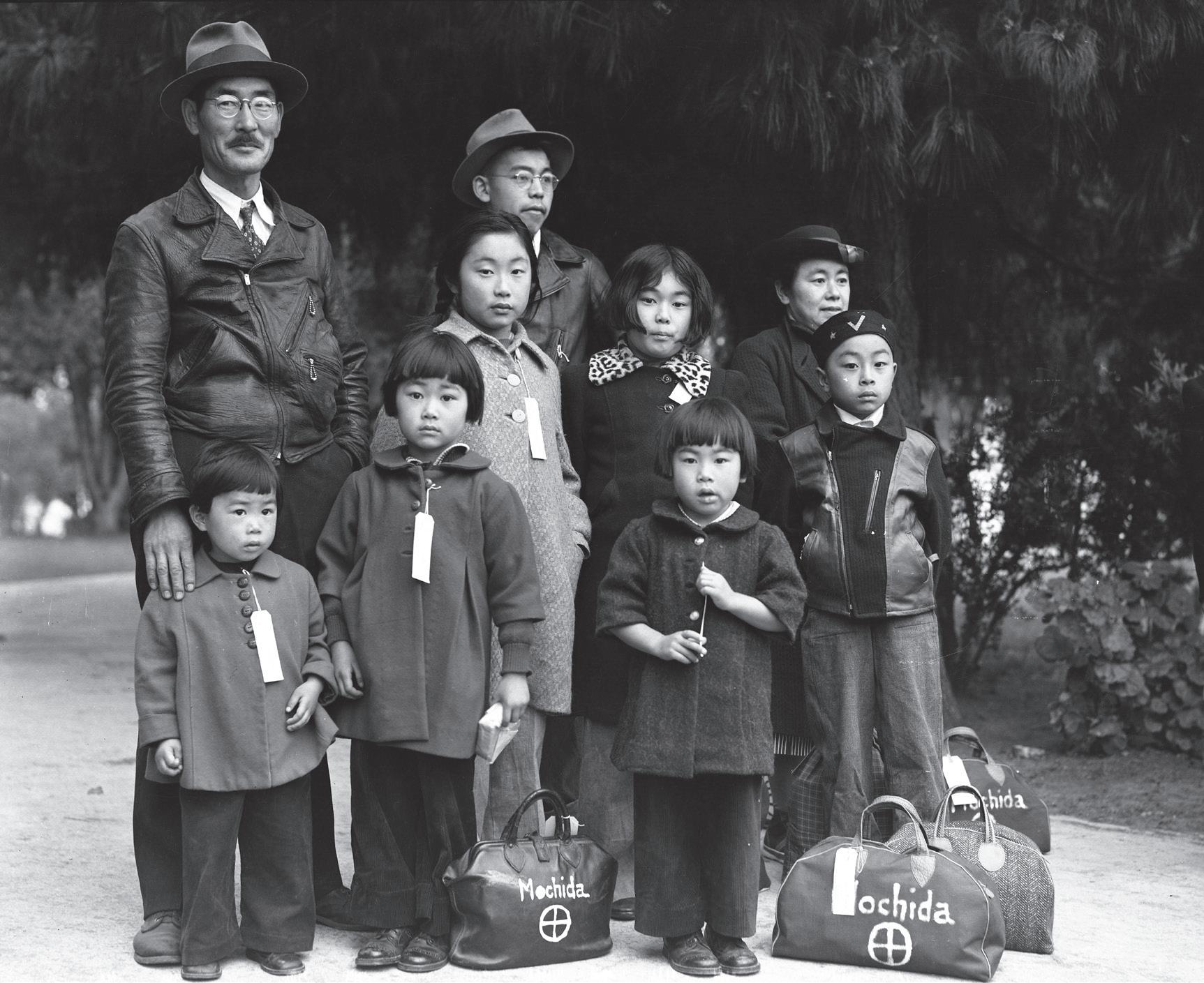


The Higher Education Consortium of Metropolitan St. Louis’ mission is to advance communication and cooperative activities among member institutions, secondary schools, related community organizations and individuals; to provide member colleges and universities the opportunity to meet to discuss topics of interest; and to collaborate on projects designed to enhance student’s accessibility to as well as their achievement in higher education.

